#really this post is a positive one but it does highlight a very negative point in my life
Explore tagged Tumblr posts
Text
this post was supposed to be a lighthearted post about aspec people by highlighting them in a joking way that still instills positivity and pride in the identity .
unfortunately too many people are too chronically online and media illiterate to realise that so let’s break down the post.
‘shout out to the people not having gay sex this pride month’
this was intentionally a worded to counter the ‘have lots of gay sex this pride month’ jokes and positivity that surround pride discussions. The wording directly associates with anti-queer activity and their frequent attempt to divert attention from queer people during the month of pride. it is worded intentionally. it is supposed to seem counter active to pride .
the humour is then seeing a pride flag. specifically the asexual flag- in which case this stands for an umbrella term across the aspec community which is more recognisable than the variety of aspec flags that i had seen whilst looking for a flag for this post . the grey line of the asexual flag stands for the spectrum between allosexual and asexual it represents the degrees of asexuality and in so, with the purple, stood for the aspec community in this post.
if the joke is still lost on you, the idea was to read a statement that counters the idea of queer pride and find it recontextualised to humorously represent an identity associated with the lack of sexual attraction; ergo no gay sex .
what this post is NOT, is a comment on varied asexual attraction. it us not a commentary on what makes a valid asexual person or whether or not you specifically will have sexual inter course this pride month . it is not saying asexuals are not allowed to have sex . this post is pushing any stereotype of asexuality . op is a sex having aspec person. i am demisexual . i have been with my partner for almost 2 years and engage in sexual activity .
what this post IS, is a joke. it’s a fucking joke i cant make it any clearer. not every single joke is going to relate to your own experiences and that’s ok. not every post about asexuality is going to relate to your own experiences that’s ok. you need to stop taking things at face value and actually engage in some media literacy to understand when something is a reductionist and stereotyping commentary which is inherently negative and when something uses a reductionist approach to convey humour because a lot of you really seem to be struggling with that one.
i fear a lot of you take yourselves too seriously and can’t find the humour in simple tumblr shitposts to the point where i’m having to actually explain what i thought was a very easy concept to grasp because it has upset a lot of people . stop taking everything so seriously .
if you are offended by the original post that is actually a you problem. that is something you have to work on where you cannot accept any form of lighthearted media that does not directly align with your own experiences . bc it’s not serious . it’s a joke x
also allo people can fuck off bc this is literally a post celebrating aspec ppl idc if your gf lives across the country or if you’re just a single loser this literally has nothing to do w u
yall make me want to kms for making me do this
41K notes
·
View notes
Text
Sharingan no Kakashi
Volumes Covered: 1-27 (first part)
Hatake Kakashi, the copycat ninja, has been a fan favorite amongst readers of the Naruto Manga since the very beginning. For as long as I have been on Tumblr, his image has been plastered everywhere to the point where his design is known even outside the manga’s universe: many people who are not usual consumers have seen at least one panel/screenshot/fanart of him.
When I first read the manga, I too became really invested in his story (he was the mysterious, possibly good-looking kind of character that as a teenager was appealing to me) but as years passed (more so now that I’m currently re-reading the manga), that appreciation shattered, or rather, dwelled.
This is not to say I hate him, nor that I’m encouraging enthusiastic readers of the manga to dislike him, my particular mention of this relies on the need to give those that choose to read this post a warning, for I will be analyzing particular aspects of his character that can (and should) be considered negative and/or controversial.
Now, I’m not going to perform a detailed list of everything his character does during the first part of the manga because not only would it be excruciatingly long (and I don’t see the point in doing so for it beats the purpose of this meta), but also, because not everything about him is to be noted. In that sense, I chose some topics that interested me the most and that I consider important (if not central) to his characterization.
Long post:
Types of relationships
How does Kakashi Hatake interact with those around him? What kind of relationships does he prefer or does he have and how does the social aspect of shinobi’s culture shape the bonds he manages to create?
Mentor-student / commander-soldiers
During the first interaction of Team 7 (meaning, the one they have on the rooftop, not the one where Naruto pranks him) Kakashi asks the newly formed group to share personal information outside the data he already was given about them, however, when is his turn to share, his responses are extremely vague and general (here), preventing the team under his command to have any sort of knowledge about him outside of his military role. Furthermore, the way he decides to reply (that is the wording of his answer to, let’s remember, his own question), is not only empty of any meaning but also seems to be on the verge of mockery. Considering the way he acts and how other sensei ask the same thing (we can see that during Guy’s flashback), we can infer that the question wasn’t of his choosing, and he’s most likely following a script.
To give some context to this introduction, Kakashi up to this point has performed the same questions for at least a few years to different groups of Gënin which failed to pass his test (we don’t know exactly how many, only that he’s being failing teams for years) - so it’s not weird for him to lack any sort of interest in this team since it might be no different from the ones he already failed.
In addition, during this exchange, there are two dynamics that he introduces:
1. The dynamic between a leader and subordinates (in the general aspect). As a commander, Kakashi is not required to share personal information with his underlings, they -however- are bound to share/do whatever he asks of them due to his superior position in the chain of power.
2. The (non-existent, yet highlighted by this particular absence) relationship between teacher and students. Kakashi seems to start their link by severing it from the very beginning: he distances himself from the team, choosing to favor the dynamic leader-subordinate over the mentor-student (this will be cemented during CH 35, where he calls them “soldiers under his command”, and reiterated on CH 43 -where he refers to them as “subordinates”). Iruka becomes, by juxtaposition, one of the only real “teachers” inside the narutoverse.
The type of relationship we see between Kakashi and Team 7 (particularly Naruto and Sakura) seems to be replicated by every other Konoha team we are introduced to, except for some dynamics that can be put, in some way, inside the latter category: Kakashi/Sasuke (this dynamic in particular is presented in quite a toxic manner, I’ll expand on this later on), Asuma/Shikamaru, Gai/Lee and (to a lesser extent, since Team 8 was never focused on), Kurenai/Hinata.
About Kakashi and Sasuke’s dynamic (the one I mentioned could be more or less put inside the mentor/student category, although that specific label isn’t as strong as I might have implied), the headcanons about their relationship overtook many aspects of their canon interactions.
It’s true that Kakashi favored Sasuke and it’s true that one of the canon reasons for him to do so was that they shared the same chakra nature (lightning), so Kakashi was more able to help Sasuke to develop some techniques. However, there’s a fandom misconception that Kakashi was planning and/or actually helping Sasuke with his Sharingan -but that’s simply not true. At no point in their training are we shown how Kakashi tries to help Sasuke once he “awakes” (rather, gets conscious access over) his doujutsu, furthermore, I don’t see an actual reason for him to do so:
First, Sasuke probably knows a lot about the Sharingan (he grew up in a clan where many members possessed it; canonically, his father and brother were users. We don’t have confirmation about Mikoto, but because of how the Sharingan might be inherited she might possess at least the genes). They had conversations about the Sharingan and Mangekyo (x, x), and Sasuke saw it while being used multiple times in its basic form (x) and even in its Mangekyou form (x), meaning, theoretically, Sasuke was more prepared and educated than Kakashi, even with no experience. Second, the Sharingan is quite literally Sasuke's nature; I don’t think he needed much help (if any at all) on how to use it.
Beyond their chakra nature training, there’s not much Kakashi does or even proposes to do. Additionally, for Kakashi, training Sasuke also meant to do the least amount of effort while also implicated to gain the most prestige: Naruto was unstable -the Seal of Minato was tampered with by Orochimaru during the chünin exams which made him fail on basic skills (even those he had already mastered); Sakura didn’t reach the final stage -and for some reason, that meant no training for her, as if she didn’t need it the most*, while Sasuke was already internationally famous for being the last Uchiha: he was the main “spectacle” during the Final Stage.
*[Sakura’s need to be trained after her tie with Ino is to be discussed in a deeper manner. The chünin exams are not real exams but displays of the military forces of each village, hence why Sakura wasn’t trained after her failure and why the focus was on both Sasuke and Naruto. The third stage of the exam is a spectacle for other Kages and Daimyos to see, hence why she -almost literally, mattered not].
To add to this discussion about Sasuke and Kakashi’s relationship, it’s important for me to touch -at least briefly (for going in-depth with this will extend this post to an unmanageable degree), Kakashi’s projection of himself onto his student. Let’s look at their similarities first in order to dispute them after:
a- They are both geniuses, which puts them in the “highest” position inside their respective teams: This particular aspect of them, in addition to receiving the constant praises of their peers during such formative moments of their life, made them particularly arrogant (this doesn't diminish the training Sasuke subjected himself to as to reach such level of skill, here).
Yet, while Kakashi refused to cooperate with his own team (Minato’s) and relied upon his newly achieved rank (Jönin) in order to tell them what to do (x, x, x) Sasuke creates a bond with his teammates to the point where Naruto -who, by all means, would refuse to obey Sasuke during their first interactions, often follows his lead or trusts his judgment. In this specific aspect: Sasuke constructed a bond with his team, while Kakashi didn’t.
[Their context while growing up is vastly different: Kakashi had to deal with something Sasuke didn’t: the dishonor that suicide brings particularly in Japanese society, x (and vice-versa, as Sasuke witnessed his brother murdering his entire family), however, both of them shared the pressure of knowing that they were the only ones capable of "bringing their families’ honor back", so it isn't weird for them to act in such manner.]
b- They share similar personalities: This is, of course, partially a consequence of the prior point (you’ll notice that Neji, also a genius, comes off as arrogant -yet I will not focus on this aspect particularly), but the main reason for this similarity is that traumatic experiences shaped their personalities and the way they approach other people.
They both are rather passive-aggressive to others (now that I think about it, Neji is also like that -and a traumatic experience was indeed the reason behind such a mindset), yet Sasuke modifies his behavior the more time he spends with his teammates (he cheers up Sakura when she’s depressed, acknowledges Naruto’s strength during the chünin exams and saves their lives multiple times even when doing so puts his own life in danger and thus, jeopardizes his ultimate goal: kill Itachi).
Kakashi, for his part, was far crueler and linear with his teammates during his youth (and I’m specifically making a comparison between kid Kakashi and kid Sasuke for that’s the parallelism Kakashi draws -which is the basis he uses to judge Sasuke’s actions later on), his response to the trauma of finding his father’s dead body was to live for and live by the rules established for Konoha’s militia to follow -to the point where emotions were aspects of himself or his teammates that he refused to acknowledge; in the same manner, he prioritized the mission’s success over his team’s safety (unlike Sakumo). Later on, with both Rin and Obito’s deaths, Kakashi modified parts of his personality in order to model himself after Obito (not the real Obito but the perception he got of specific parts he chose -or thought worthy of mimicking -more of this will be discussed in the Nationalistic Mindset part of this post).
c- They both possess guilt complexes from which derived a strong feeling of inadequacy: This particular aspect is intrinsical, I believe, to Kakashi’s approach to Obito’s dogma (I won’t be expanding much for this is tackled, again, on the Nationalistic Mindset title). And again, both of them share a similar complex, yet their reason to have them is completely different (yes, they both might have survivor’s guilt, but it’s not the one I will speak of): Kakashi’s remorse lies in the fact that he wasn’t able to protect his teammates (once he formed a bond with them), he failed Obito -who died to save him despite Kakashi’s earlier attitude (I’m not diminishing Kakashi’s life, I’m pointing out Kakashi’s possible perspective about Obito’s death), and later on he failed him again when Rin died (he also failed Rin herself for not be able to prevent her kidnap). The manga doesn’t show us much of Kakashi’s trauma, but it’s somewhat safe to assume that he models his personality after “Obito” in response to this guilt, making himself someone “worthy” of both their teammates' sacrifices: he vows not to fail at protecting his teammates again, (“I will never let my comrades die”, here) for that’s what Obito taught him (here).
Sasuke’s guilt also has to do with his own incapacities, yet his main issue is that he wasn’t able to do anything against his family’s murderer (he arrived at the compound after they were killed), and it’s this specific event that germinated and blossomed into Sasuke’s core objective: Avenge and restore his clan [honour]. He could do nothing then, but he will do so one day. None of his family members “sacrificed” themselves for him to live (Itachi might have killed them to “save” Sasuke, but they would have been murdered regardless; sacrifice implies that those who perished took a conscious decision to die in another person’s place), so their background is nothing but different.
In addition, these specific events (including Sasuke’s incapacity to fight against Gaara during the invasion or against Itachi in Shibuya), shattered both their conception as geniuses (which, in lieu of the arrogance they constructed around it, makes the fall from grace much more difficult to bear), which pushes them to extreme changes: Sasuke, to flee Konoha in order to polish his abilities and achieve his goal; Kakashi, to make his life a memoir of “Obito’s dogma.”
Personal bonds
The types of relationships Kakashi values are first shown in CH 8 when we are introduced to the Memorial Stone. He refers to those who are carved in such space as his “best friends”, a statement that is (at least) questionable once we learn Kakashi’s background and how his relationship with Obito and Rin actually was prior to their death. The only possible explanation about why they are his best friends is that he developed a deep connection with them after their death (in lieu of their sacrifices and the feeling of guilt such occurrences brought upon him), it’s possible (headcanon alert!) that he also twisted specific memories of them in order to elevate them and -later on, force himself to become someone “worthy” of their sacrifices, as he did modify the original quote from Obito.
In that sense, Kakashi’s relationship with Guy (at least during their first interactions) is particularly blown out of proportion, out of the three jönin-sensei, Guy is the only one who stands alongside Iruka (hence, against Kakashi, Asuma, and Kurenai) and asks them -but mostly Kakashi, to reconsider their decision to register their rookie teams in the exam. Kakashi replies by laughing at him, justifying his choice by stating that “what they lack in experience they make up in surprises” (I guess “surprises” encompasses the fact that one of them heals almost instantly thanks to Kurama and the other one already has the Sharingan, which replies absolutely nothing to the actual matter at hand), and finally proclaiming that team seven will make Guy’s team “eat dust”.
After that, their next interaction is during the preliminary rounds, where Kakashi ignores Guy yet when Lee is fighting Gaara, Kakashi claims to be (literally) disappointed in him for teaching his student a forbidden technique, even if later on tries to cheer him up when Lee loses. And yes, the interactions are hilarious, yet the relationship is carried solely by Guy’s character for Kakashi is particularly closed on his one-sided relationship with his deceased team. That’s my point.
Emotional Manipulation
I have established before Hiruzen’s approach to the Will of Fire (exploiting people’s bonds and emotions in order to tie them to Konoha rather than a person/clan; basically constructing Konoha as a symbol that encompasses those who are dear to the shinobi, creating a nationalistic mindset where family=village. x), now, how does that dogma interact with Kakashi, influencing his actions and interactions with other people -particularly (but not limited to) Sasuke?
Kakashi has linked Sasuke’s capacities to the Uchiha Clan’s value since the bell test (CH 7), and repeated the behavior more cruelly in CH 18, and again in CH 27 (albeit this time positively, in the face of an enemy). The technique he uses to “push Sasuke forward” (in the sense of giving him motivation, since Sasuke’s bond with his family is intrinsic to him) can be (should be) considered emotionally manipulative. Should Sasuke fail or perform at a lower level than expected, it means the Uchiha Clan’s honor downfall.
Furthermore, Sasuke is not the “finest hope” of the clan, as he called him, he is the only hope since the only other member of the clan is Itachi, who massacred them, and Kakashi is aware of such circumstances. It’s different in Naruto’s case (Kakashi also displays emotional manipulation towards him) because he’s not linking a traumatic experience to his value -furthermore, he’s not linking the honor of an entire (deceased/killed) clan to his value, which is what he’s doing to Sasuke. The caption on Sasuke’s panel is “stab”, the words of Kakashi were purposefully chosen in order to downgrade Sasuke’s ego (I’m not denying he still uses them to “motivate” Sasuke -I’m questioning his methods). If we also take into account that Sasuke, at this point, has seen Kakashi’s Sharingan (and believed him to be part of the Uchiha clan) it gives his input more weight since Sasuke’s doubt about whether or not his teacher is related to the clan hasn’t been addressed yet (Sasuke didn’t ask nor does he know where Kakashi got the eye, and since he doesn’t know doujutsu can be transplanted yet, he assumes he might be a distant relative).
In this sense, is to be added that, one, Jönin-sensei vow upon their clan’s honor that their students are ready for the Chünin Exams (CH 35), and two, Hiruzen, in CH 65, states that shinobi defend not only the balance between nations -but also, the honor of their village. It’s no surprise then that Kakashi is so insistent on tying the Uchiha’s honor to Sasuke’s name (Naruto is an orphan to whom a “generic” last name was given -even if it’s his mother’s, he represents no clan nor has any knowledge about his family, Sakura’s family name isn’t renowned nor important enough for him to even care).
However, and despite the fact that Kakashi’s abasement of Sasuke is harsher than the one he performs on Naruto, it doesn’t imply that such degradation doesn’t exist: Back in CH 10, after Team 7 is attacked (and for the first time for the three gënin, might I add), Kakashi says to him, “it never occurred to me that you would freeze up,” meaning, he elevates him first (implying that he did consider him capable enough to respond to an attack of such caliber), only to dismantle him from the previous conception he -apparently, possessed. His words leave such an impression that Naruto cuts himself with his own kunai: from a narrative perspective is a powerful moment -but hadn’t been for Kurama, Kakashi would have had an injured student (he even mentions he could bleed to death), so why apply such psychological pressure to a gënin that has already a lot of emotional stress from the earlier attack? From a teacher’s point of view, it doesn’t make sense, however, it does make sense from a commander’s point of view, something Kakashi has actually had experience on (Team 7 is literally the very first team he passed), so his methods of “teaching” are yet to be polished.
[Jönin-sensei is a title where jönins (soldiers) are told to pass on their experiences/techniques to future members of Konoha’s militia, without being given pedagogical education to interact better with their students. Being a teacher (that is, a person actually capable of educating, with everything that it entails), it’s not important -being a good soldier is. This is incredibly highlighted during this interaction back in Chapter 3, where Kakashi calls this pedagogical situation a “mission”].
But this type of approach isn’t reserved solely for those under his command, showing that Kakashi either is not using it consciously as a tool -but rather is the way he was approached and, therefore, believes to be the usual way to speak to others; or that he’s constantly on “shinobi mode”, meaning, he uses every tool at his disposal (always, ever) to achieve the result he considers is the best (I, personally, believe this option to be the most truthful to his character, for he performs emotionally charged speeches to his own peers).
An example of the point previously made: During CH 22 [Wave Arc] Inari and Naruto get into a fight, Inari screams at Naruto and the main character responds by calling him a crybaby. After the confrontation, Kakashi finds the little boy, and we have an interesting interaction where Kakashi talks to him and (without Naruto’s permission) tells him part of Naruto’s background for no real reason but to appeal to the emotions of Inari and build a case for his student (which isn’t strictly necessary, the kid doesn't have to like Naruto and -likewise-, Naruto doesn’t have to like Inari for the mission to be successful).
What we see is what follows: Kakashi applauds Naruto’s way of handling trauma (he doesn’t cry rather, he hides his feelings) and, by juxtaposition, he brings back Naruto’s claim about Inari (him being a cry-baby) in order to criticize the young boy. Inari -who is a kid younger than Naruto-, is a coward and uses his pain to justify that supposed cowardice, Naruto doesn’t, which makes him better and should be reason enough for Inari to one, get along with him; and two make him a role-model.
Now, Inari is a civilian who lives in a civilian village and his experiences have nothing to do with those of a shinobi. Kaiza (Inari’s father) was publicly killed because he tried to defend his hometown, but he lacked the tools a shinobi possesses. Naruto grew up in a hidden village and the shinobi’s approach to death is completely different from what a civilian kid might be taught or experience. Naruto doesn’t have to know this, so his hostile reactions towards Inari are understandable from a character’s point of view, but Kakashi's reaction isn’t. People can argue that Kakashi, like Naruto, was taught and lives solely under the cultural aspects of his village, which is the reason why he brings Inari’s experience to his own sphere of understanding, yet while we can see that as his reasoning, it doesn’t mean we should condone it, as he has more experience outside his cultural bubble.
His words are successful, as we see here and here. Inari internalized both Naruto's and Kakashi’s speeches and instead of running to escape and reach safety, he decides to help his captive mother (who has been taken hostage by Gato’s men). Let’s add some more context: a young, untrained boy is forced through emotional manipulation (and here I will spare Naruto due to his lack of experience, but not Kakashi, who might understand things through the veil of his own culture while lacking the knowledge of civilian rules -yet he is aware of civilians incapacities during armed conflicts and still “pushed” Inari to take action against Gato’s thugs by glorifying Naruto’s behaviors) to “stop” being a coward (meaning: to confront trauma in a particular manner: the shinobi way, that has no claim in civilian society); and his life had to be literally saved by a ninja as a consequence. Furthermore, his cowardliness wasn’t an issue he was already struggling with before the shinobi arrived to the island, it was an uncertainty introduced by the group (brought in by Naruto -who knew no better- and cemented by Kakashi).
It’s when Sasuke “dies” and Sakura recites one of the shinobi rules, that we learn that Kakashi and Naruto were judging Inari’s “cowardliness” through the perspective and internalization of the same rule Sakura is now reciting. Inari, as a civilian, can't be judged by those premises.
I have pointed this out in some other posts but there’s no harm to reiterate: the pass from childhood to adulthood -unlike in the civilian society that follows different rules, is marked by the bestowal of the headband. That is, adulthood has little to do with age and more to do with rank. With that mentality, Naruto and Kakashi’s behavior towards Inari is slightly more understandable since, to them, his age is not an excuse to behave like a “child” (furthermore, Kakashi took the Chünin Exams when he was six, meaning he was considered an adult since that age). Yet, again, where Kakashi fails is in understanding that Inari is not governed by the same principles that he is.
Nationalistic mindset
How do the Will of Fire and Obito’s apparent dogma interact? Did Kakashi’s character really have the possibility of seeing Konoha as an oppressive state that considered him nothing but a mere tool? Did he have the “potential” to rebel?
Back in Wave Arc, among many things, there’s an interaction between Tazuna and Kakashi, where Kakashi mentions that a previous Hokage (we aren’t told who) taught his people to “fight for what is right”, selling the idea to the civilian in front of him that his hidden village (specifically) is the “good” side against the “evil” side (Zabuza, Gato -even other hidden villages). However, this particular speech of Kakashi, which he gives solely to Tazuna and not to his subordinates (who, by Tazuna’s standards are children), clashes with the prior idea that “missions’ feuds are high and we do what we are paid to do” (assassinations or babysitting). Meaning: there’s a narrative to be told to civilians to shape their view of shinobi (particularly Konoha’s), and the actual reality that only Team 7 (as ninjas), gets to see.
In addition, during Kakashi’s second fight against Zabuza (CH 30), Kakashi states that Konoha (therefore, he), knows about the swordsman’s attempt to coup and kill the current Mizukage -alongside his wish to raise funds to attempt another coup after his failure. We learned previously thanks to Haku’s background that there’s a bloodline cleansing currently happening in Mist; a genocide on such a large scale can’t be kept secret that long -furthermore, there’s no indication that the murders are happening quietly either since those who possessed Kekkei Genkai were pushed to hide their bloodline; and if Konoha knows about Zabuza and his attempt to take over the government, then they surely know about the reasons behind it.
What I mean by this is what follows: Kakashi and Konoha claim that they fight for “the right thing” to those civilians they encounter, but do nothing -neither military nor diplomatically, to stop those massacres from occurring (nor do they take a stance against them either, as it reduces Mist numbers and weakens their military power). They’re still pretty much in touch with the Mizukage that carried out/ordered such killings, for his government was the one that told Konoha about Zabuza’s attempted coup when declaring him rogue.
Kakashi downgrading Zabuza for working for Gato is, in a way, absolutely comical because not only is he working for an authoritarian regime, but he also downgrades someone who (even as despicable as he might be) is actually trying to do something against those who wronged him. Kakashi (under Konoha’s mindset), can’t differentiate between a person’s ambitions and their ideals, they might seem equal on the surface, but they are intrinsically different: One goes after an individualistic goal, and the other one is founded on the possibility of a communal achievement. To Zabuza, another individual raised under shinobi culture, killing innocent civilians to gain funds in order to bring down his oppressive government is a plausible course of action (we can make a value judgment on this, but this does not dispute the idea of Zabuza taking actual actions in order to overthrow the oppressive government in his village).
As said before, Kakashi doesn’t seem able to differentiate between personal ambitions and ideals, therefore, he will never be able to take a stand against Konoha. Hence, the belief/headcanon where Kakashi rebels against Konoha or has the “potential” to do so should Kishimoto “allow him to” is contradicted by Kakashi himself, to the point where he defends Konoha even when it’s not being questioned (building it in a positive light).
Furthermore, there’s an interaction that pretty much confirms this: Here and here. Kakashi admits that the belief system under which a shinobi’s life is valued “bubbles beneath the surface of his mind, disturbing him” (he also uses the plural, referring to the ninjas -as a kind, which means that from his perspective everyone feels uncomfortable with that mindset, and yet, no one seems to question it, for those who questioned are then labeled as missing-nin). Even if Naruto later on promises that he will create his own “Nindo” (and by context, that destiny is presented as opposed to the “I’m a tool” mentality previously discussed) and Kakashi smiles, there’s no actual denial of his current belief system.
Kakashi was intended to be the representation of a nationalistic/pro-shinobi system mindset, as he follows the narrative’s stance (which, in turn, follows Naruto’s). Even after everything Kakashi said to Zabuza in order to degrade him (like, for instance, questioning his standards for affiliating with Gato and staging a coup), the moment Zabuza says “I won’t kill Tazuna because I won’t get paid, so let’s not fight”, Kakashi immediately agrees. His problem with Zabuza isn’t that his mindset is different per se, but that is opposed -at that moment- to Kakashi’s and his mission, once Zabuza is not at the other end of their fight, everything is forgotten/forgiven (he simply doesn’t care anymore).
Later on, because of this nationalistic ideology, Kakashi is willing to sacrifice his students’ well-being: Again, the Chünin Exams (analysis I made here), are nothing but staged wars in order to display each village’s military forces to draw the attention of potential customers; therefore, even tho Kakashi knows about Sasuke’s condition (Orochimaru giving him the Cursed Mark) - he stands against Anko when she asks the Hokage to pull Sasuke out of the exam. Even though he later on warns the child the fact that he allows such a dangerous situation to occur while putting the whole weight of the issue on Sasuke’s shoulders, is rather telling of his priorities.
Kakashi’s phrase (well, it isn’t Kakashi’s phrase but actually his interpretation of Obito’s) “I will never let my comrades die” (x) is solely true until Konoha’s wellbeing (in any sort of way, including prestigiously) is on the line. Dying is the only thing Kakashi protects them from, physical or psychological damage isn’t included.
The idea of him respecting and following Obito's true dogma is an absolute contradiction because Obito’s core ideology and Konoha’s are intrinsically contradictory, they can’t coexist and still be truthful to their basis. To Kakashi, Konoha is the symbol of peace -of his comrades, so the physical existence of an individual isn’t as important as the symbol’s survival, therefore, sacrificing his soldiers’ wellbeing to give the village more leverage during the chünin exams isn’t a problem -unlike them dying at the hands of Zabuza, which would mean Konoha failed on the mission and lost three gënin in the process.
And here I'll add this: Obito's actual phrase was "Sure, in a ninja’s world, those who violate the rules and fail to follow orders …. are lower than garbage. However….Those who do not care for and support their fellows…are even lower than that! If I’m scum…the rules are no good to me! And if breaking them makes me the wrong kind of shinobi…then I’ll crush all the so-called shinobi!!" here. In lesser terms, Obito's dogma is this one: If a system (shinobi's/Konoha's) prioritizes political/warfare success over the lives of those fighting for it, I will not be a part of such a system - furthermore, I'll rise against it.
My claim of Obito joining Madara in his quest as something always existing at his core sustains mostly in this. Rin is a catalyst, for I'll admit, he didn't turn completely against it until her death when the system personally affected him and those he cared for (can he be blamed when he was taught to be loyal to it? It isn’t weird for him not to see such flaws until they impact him specifically, we can’t fault him for something so humane), yet his beliefs are right there and have always been there.
The very important, very much intrinsic difference between Obito and Kakashi's approaches is that Kakashi (and later on, Naruto) puts the weight of his comrades' well-being upon his shoulders and his shoulders alone (his trauma with Obito's death, who sacrificed to save him, and Rin's who was "killed'' by his hand, are probably the main reason for Kakashi's specific approach to his former classmate's dogma), while Obito disputes the very basis of the issue. Obito isn’t blaming Kakashi per se but the rules that Kakashi, as a commander, chooses to follow indisputably (x, x). Obito will gain no awards or recognition for saving Rin while compromising the mission, on the contrary, he'll gain the same punishment Sakumo did: ostracization, now not only from the Uchiha but also from the general population.
And here's the thing: at that moment, his respect for Konoha is so little that he doesn't care - going against the rules is going against Konoha, fine "I'm scum, I'll crush the so-called shinobi!!". Here Kakashi "fails" (yet it's to be mentioned he's a child soldier in distress and in the middle of a battlefield) to externalize the critique and place it upon the rules (hence, the system) where it belongs, rather, he internalizes it and blames himself, believing that he's responsible for everything since he was "too uptight" to bend (x and x).
Obito and Kakashi’s opposition comes from the answers to these questions: "What are they fighting for?" and "Why are they fighting for it?" (the what's and why's in narrative and character-construction by Dushman-e-jaan). The first answer might be similar as they both might answer, "Konoha", particularly at that point in time; it's the why, which drives the what, that's different. For Kakashi, as established prior (although, during his childhood, that might have been the answer as that's what he was told to do and what he was taught to want, rather than a personal conviction), Konoha in and of itself is what matters, the place, the land, the symbol of peace; while Obito's core belief would push him to say "Rin", as in, an individual; hence, “the people”. Then why would he choose to sacrifice Rin (the people) in exchange for the survival of a place created to ensure their well-being? In his eyes, it makes no sense (and yes, later on, he “betrays” his own core beliefs as he carries out the UCM for a "greater good", yet he does that because he considers the real world to be hell, so he cares not for it -x,x-, as the only world that matters it’s the I.T one).
Obito was written by Kishimoto to be Naruto’s “dark” parallel, as he was a morally good child (wanted to become Hokage to stop the war, helped ladies on the street, even sought his master advice and changed his stance on Kakashi after Minato’s speech) that the environment transformed onto one of its darkest consequences (and well prior to Madara’s intervention as he claimed he would crush the “so called shinobi” shall he need to). Meanwhile, Kakashi reflects the pro-shinobi stance as he never even begun to question it when a child (the same could be said for Neji, who showed revulsion to his personal situation, and was definitely closer than Kakashi to rebel, yet he never questioned the status quo in itself).
It’s difficult to give closure to a post this charged and long (as of now, it’s fourteen pages), so I’ll finish up with this: Whether you agree or not with this post, try not to just blatantly insult me (if you end up doing it, oh well). I genuinely don’t care if you find my analysis revolting, and it’s just as easy as ignoring my blog altogether or creating your own post with your own takes and reading of the manga; I have no problem discussing these topics, but if your entire argument relies on your personal headcanons and you provide not a single panel of evidence I’m ignoring you, so don’t bother.
Here it is, spent months on this post (it depended on my re-reading of the manga, which is why it took this long), so I hope you guys enjoyed it and I want to personally thank those who read all of this, I genuinely appreciate it.
Cheers.
#naruto#naruto meta#kakashi#kakashi hatake#anti kakashi#anti kakashi hatake#anti shinobi system#anti konoha#obito#obito uchiha#sasuke uchiha#sasuke#naruto uzumaki#uzumaki naruto#uchiha sasuke#sakura#sakura haruno#haruno sakura#team 7#team minato#rin nohara#team gai#long post
185 notes
·
View notes
Text
The Fraught Family Ties of the Rose-Xiao Long Household:
Sorry for the ramble, I wanted to share something born of a discussion I had with someone regarding the canonical relationship on the Rose-Xiao Long sisters & their father figures.
So, I often find Tai (& Qrow) propped up as good father figures who maybe just had some moments of weakness but either got better long before canon or during the show and who are super close with Ruby & Yang with very healthy relationships.
Given possibly my most popular post, (Yang & Ruby's childhood) I don't think this is a universal stance, certainly not these days, and I don't think its well supported in canon either.
This doesn't mean that love isn't there, but love and resentment can live in the same house and the Rose-Xiao Long household is far more complex than I think people give it credit for.
Now, some will probably highlight positive tones and references in the early volumes, but here's the thing. A child growing up around something can get used to a lot. Ruby & Yang are clearly very used to Qrow stumbling home utterly wasted, even carried by strangers and needing to take care of him. This is normal to them and neither show any resentment towards it until on their last nerve.
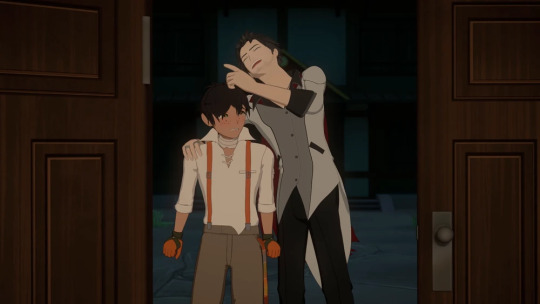
That is to say, Ruby and Yang are fine with Qrow's drinking and smile through it, riiiight up until they themselves are on the edge of snapping real hard over things such as in V6.
Neither of them express their trauma like say, Jaune does, who tends to be quite open with his resentment and prone to lashing out. The sisters smile through it, they may express frustration or anger at other things, but not their loved one's, which makes it easy to pretend everything is cool and normal.
Hell, keeping things light with humor is explicitly noted to be how Yang copes and Ruby is shown consistently beginning to show sadness before quickly bottling it up up. This is just how they handle negative emotions they cant comfortably express.
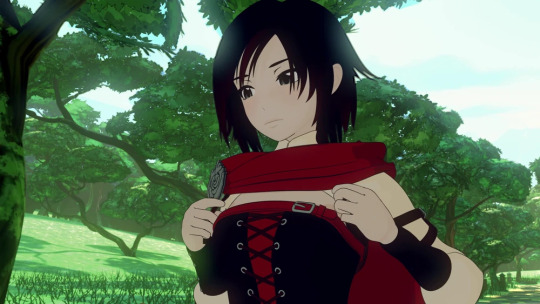
Thus, while Ruby expressing frustration at Yang giving Tai like advice in V1 doesn't indicate hostility, nor does her being all smiles around his presence in V3's opening indicate everything is super awesome.
After all, things are good at that moment, but let's take a look at the end of V3.
Tai is clearly worrying and trying to fuss over Ruby. But she is very neutral on the whole thing, mostly just trying to get intel on what the fuck happened from him and not being remotely upset when Qrow makes him leave. She show's a bit more vulnerability around Qrow, but is still very focused on the practical questions of what happened.
Its only when she's alone with Yang, that Ruby really becomes expressive with her emotions and more to the point, shows outright uncertainty in what to do. This leads her to being shocked when Yang is in no fit state t provide her with the guidance and support she clearly craves and expected.
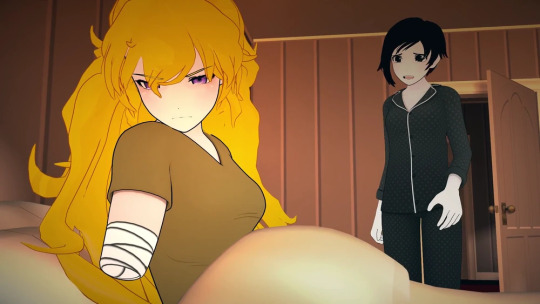
Ruby also specifically addresses her letters to Yang and broadly speaking doesn't really seem to think about Tai all that much. Again I don't think she dislikes him, but given she openly acknowledges Yang as the one who raised her & Yang herself noted she had to keep the family together...
Well, I think that Ruby doesn't really perceive Tai as a parent, strictly speaking. In the sense that I don't believe she views Tai as someone to go to for comfort or advice or guidance.
He's her dad and she loves him, but he's less of an adult to her than Yang was. In that same vein Qrow is a Huntsmen, her mentor and uncle yes, but the former I think inform her behavior with him more than the latter.
Now, let's also compare Tai and Yang's relationship a little.
We know Tai taught her how to fight, but he doesn't show any real understanding of how her Semblance works or her fighting style given she has utilized plenty of blocks, dodges and clever strategies in the first three volumes. What's more him critiquing her for fighting that way and making it her fault when he taught her feels suspect to me.
(I would note it was Yang who realized Ruby needed CQC help before anyone else, so she clearly thought deeply on this stuff.)
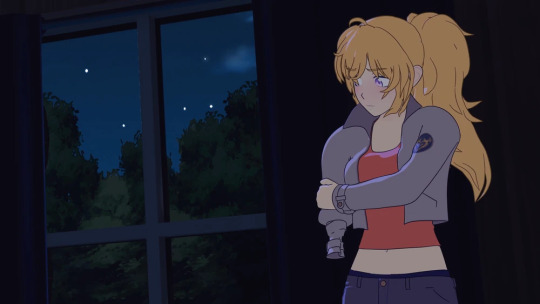
But beyond that, we see Yang is heavily isolated, both from how the camera work frames her. But also because she us housed in a guest room and that Tai, while obviously unhappy about what happened overall seems far more focused on Ruby in terms of trying to provide some care. What's more, when she's clearly distressed he walks away and leaves her to stew.
Yang's shown still doing lots of work around the house, despite everything and his efforts to 'help' her are all about getting her back into the fight over worrying for her safety like he did Ruby.
This is a big thing for me, Tai was clearly deeply upset when Qrow wanted to speak to Ruby alone and terrified when she left.
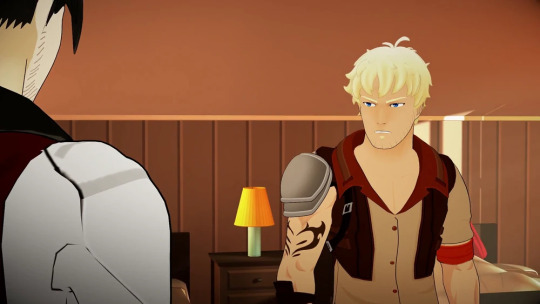
Meanwhile when it comes to 'helping' Yang its all about getting back into the action and going after Ruby. He doesn't seem to mind the idea of sending her into danger.
Then there' show he hypocritically dismisses her trauma and depression while at the same time diminishing her maturity despite him having left her to raise Ruby and keep the family together.
He also makes his help for her conditional on her no longer "Moping" while its her teachers who barely know Yang that provide actually useful guidance on healing.
When alone he also frames 'caring for her' IE letting her live in the house and take care of herself, like its this heavy burden that is keeping him from Ruby.
This is despite the fact he ultimately does not go after Ruby.
You can claim its a budget thing the show we have is the show we have. Thus, he sends her off to parent Ruby instead of himself. Also Tai outright compares Yang to Raven despite them being radically different and honestly Ruby being a lot closer to even the positive traits he ascribed to Raven.
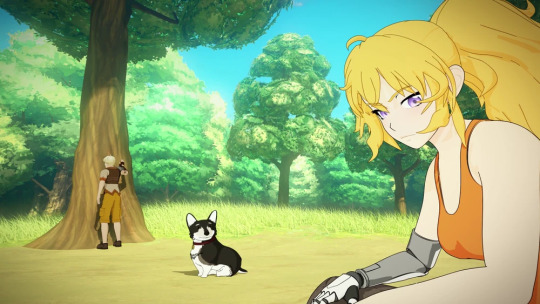
Thus I think there's an element of projection that leads to Ruby being preferences between the two but also Tai having come in too late to really be seen as the parent he wants to be perceived as.
Now, let's look at Qrow.
Both sisters are clearly used to him staggering or being carried home drunk and needing to take care of him, meaning they have been doing this since childhood.
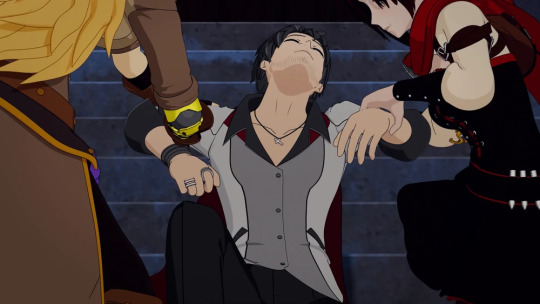
This would have a hugely negative impact on their mental wellbeing and impact how they perceive him.
Beyond that, I am unsure how close he even is to Yang outside the superficial. Some of that may indeed be down to time, but there have been periods where they could have shown a deep bond and its not manifested.
When Yang is framed, her team, two of whom have only know her for a few months and have plenty of trauma that would make them rightly suspicious choose to believe her and sympathize with her.
Qrow meanwhile says she is either lying or crazy and does not express much in the way of real empathy or trust.
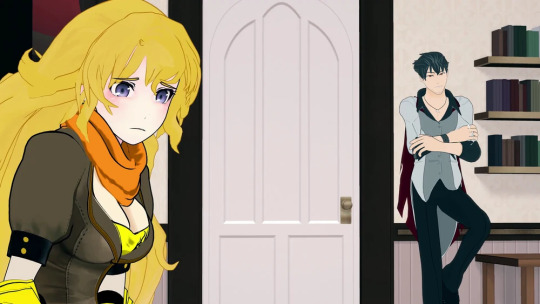
Rather than showing an interest in maybe trying to resolve the issue or help her through decides that maybe directing her to Raven might help. He obviously cares, but generally never shows much of the same concern or affection for Yang that he does for Ruby.
Granted even then Qrow requires caretaking from both his nieces.
What's more he often tethers Ruby to Summer. So while his mentorship of her does let her be a little more vulnerable with him than Tai its still an unbalanced relationship.
However outside of that, Qrow's generally fairly good with Ruby and her influence on him seemed to be the primary thing that stopped him drinking. He also shows a great deal of faith in her in general, though how much of that is projection likely varies.

But he mentored Ruby so its natural they are maybe a little closer.
Still, I think Ruby & Yang held Qrow in higher regard, at least as a Huntsmen than their father, there's a lot of baggage to the relationship at a minimum.
I also think Ruby & Yang's lack of communication seen in later volumes is sort of reflective of the families unhealthy dynamics evolving between them.
Yang being forced to raise a sister two years younger than her is already a heavy burden on both of them. Yang from having to step up and fill the roll of an adult as a child & Ruby because no matter how hard Yang tried it as never gonna be perfect but she couldn't exactly complain about it either.
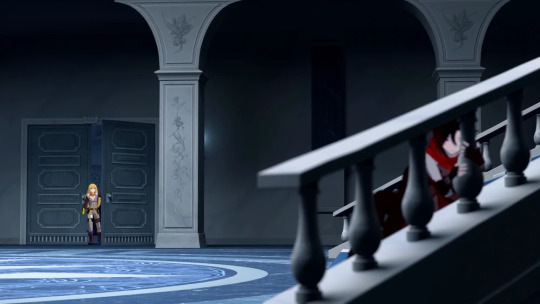
So both just sort of smiled through the pain as they grew and came out fairly functional and happy if carrying a lot of baggage beneath the surface. This is why both respond to grief and trauma in a similar manner, pushing the issues down until they explode or collapse. It was how they got by.
They were also extremely close, for all that Yang talked of Ruby maybe trying to branch out onto other teams, she instantly tried to seek her out in the Emerald Forest, saved her a spot in the auditorium and generally tried to assist and advice her along with expressing great pride in her.
Ruby bore with with a mixed degree of playfulness and teen like annoyance, while still wanting to cling to Yang. She was also very comfortable early on with expressing her concerns around Yang, such as with Blake being so stressed and not knowing what to do about it & seemingly had total faith in Yang's ability to resolve things.
As previously outlined, when Ruby was seeking comfort and guidance after the Fall of Beacon she went to Yang and was shocked when Yang couldn't provide her what she needed and quickly began separating herself, clearly deeply impacted.
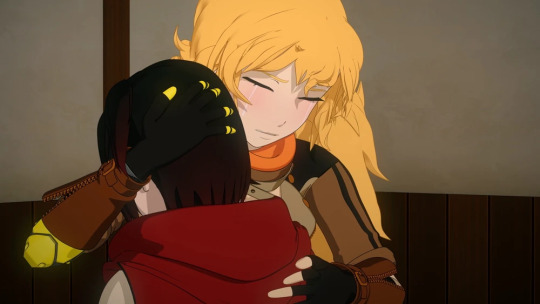
Yang remained the center of her homeward focus after that fact and when Yang returned she was able to express vulnerability with her.
Briefly.
However, Yang soon showed that her recovery was not as complete as she wanted to project and again Ruby was at a loss for what to do with a Yang who is upset.
Keep in mind she's entirely capable of comforting a drunk, hung over or otherwise very upset Qrow, but the prospect of comforting Yang leaves her shuffling nervously outside the door while Weiss helps her.
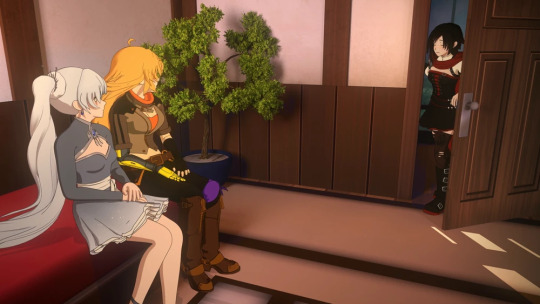
Ruby's perception of Yang seemed to have put her on something of a pedestal in the way a lot of children do their parents where its hard to start seeing them as a person.
& When Ruby did start seeing Yang as a person, her complexes regarding leadership caused her to see Yang as someone who needed protection.
This caused her to freeze Yang out of her issues, we see this with her rejecting Yang's efforts to comfort her in V8, responding instead with sullen silences or sharp emotional jabs to try and make Yang go away.
Yet at the same time, she didn't entirely try to keep the façade up, perhaps in part because she couldn't.
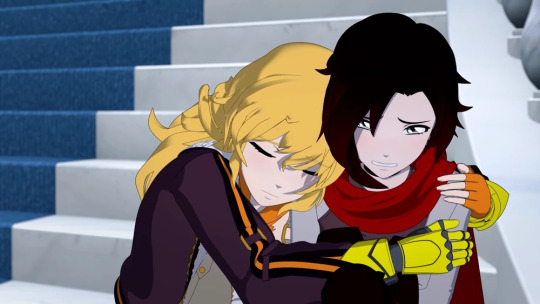
I also think there's a part of her that sort... Expected Yang to know what to do and to say for her even though Ruby has changed as a person and is no longer communicating clearly like she used to.
Which then causes her to resent Yang for not being able to say the right things and provide the right assistance like she did when they were kids. Even though Yang doesn't know how Ruby feels their relationship has changed and can't know with Ruby actively avoiding acting in a manner that would elicit her concern.
Basically, this is an extremely messy family.
It has four actual adults, the most competent of whom martyred herself. One of whom left because she couldn't handle it and two of whom failed when put to the test.
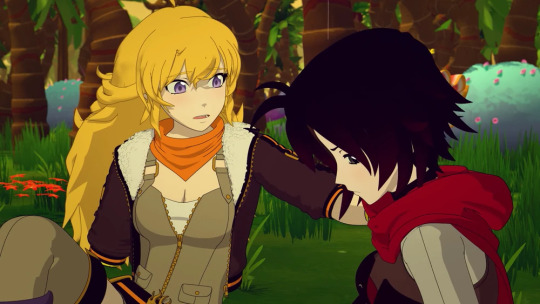
This left the role of grown up in the room to Yang who had to keep the family together and raise her sister. While Ruby had to basically become the least troubled child possible to make this easier on them all.
Raven cutting herself out of their lives and her ties to Yang, while Summer being a beloved martyr seems to have also rippled down to their kids.
With Yang almost being like the black sheep of the family. She's the one they expect to do something immoral or "crazy' and generally expected to take care of herself and Ruby without any kind of acknowledgement or significant assistance.
Meanwhile Ruby is regarded as a sort of proto Summer, this beacon of purity, which leaves Tai over protective but ultimately inactive leaving the task of helping her to Yang. With Qrow expecting the world from her which just applies more pressure.
I do think everyone of them love each other, but I also think there's also a lot of resentment, frustration and projection going on here, with many utter failures of parenting. These ultimately caused the families relationships to never developed into what they should be and are instead leaving them in an odd sort of limbo; with a lot left unsaid and unhealthy.
#RWBY#Ruby Rose#Yang Xiao Long#Tai & Qrow did not do a good job#Do not clown on this post#Family trauma#RWBY Analysis#Yang raised Ruby#Ruby had to be 'OK' all the time
147 notes
·
View notes
Text
The Lost Hero, Tristan and Piper McLean, and Native Americans and Palestinians.
TL;DR: An essay/vent about Rick Riordan writing offensive stereotypes about Native Americans and Arabs while including a positive throw-away line about Israel and the connotations of this in young adult fiction. And insight into the relationship between Native Americans and Palestinians.
So, I'm rereading The Lost Hero as Rick Riordan's several mythological series are comfort books for me that I reread every so often. Some quick background that I'm sure is a common sentiment among readers: when I was younger and first read The Heroes of Olympus books as they were published, I never really questioned the writing or characterizations. I was too young and too caught up in eagerly eating up more of the Percy Jackson world that I loved. As I got older, learned more about the real world, reread and actually analyzed the books, I found a lot of flaws that has made the quality of The HoO series incredibly incomparable to the Percy Jackson and the Olympians series. Every time I've reread the PJO series, I've gained further appreciation for the writing (which has its own flaws, of course), whereas my frustration has grown with The HoO series, lol. Again, I know this is not an unpopular opinion.
This includes Piper McLean's characterization and the representation of her Cherokee ethnicity. I've read some insightful posts in the past explaining how Rick Riordan really messed up with Piper and while he's gained brownie points for diversity and trying, it does not absolve him of the specific choices he made with representing her Cherokee culture and how his writing is insulting to the broader Native American identity.
Throughout Piper's chapters, readers learn several things. Piper is Cherokee through her father, Tristan McLean. They are from Oklahoma and her grandfather Grandpa Tom had a home that Tristan still owns despite being a famous actor because it is the physical link to his ancestry. Grandpa Tom and Tristan taught Piper a lot about her Cherokee heritage including their beliefs and folk tales which Tristan has denied believing in them the way his father did. He still obviously feels strongly about his identity and the pain of historical discrimination and oppression against his people and this trauma passes onto Piper. It is the reason why he never plays any Native American role.
Specifically, I want to highlight this excerpt from Chapter XXI, in which Piper recalls a conversation with her father about the movie roles he's accepted.
"He'd played all kinds of roles— a Latino teacher in a tough L.A. school, a dashing Israeli spy in an action-adventure blockbuster, even a Syrian terrorist in a James Bond movie."
She then follows by asking her father why he never accepts Native American roles.
"'Doesn't that get old? Aren't you ever tempted, like, if you found the perfect part that could change people's opinions?'
'If there's a part like that, Pipes," he said sadly, "I haven't found it.'"
When I first read this, I remember being deeply uncomfortable with the Syrian terrorist example. Yeah, as a Muslim, I'm very familiar with the stereotypical Middle Eastern terrorists in media. I know the reason it exists and why it will continue to exist. Riordan could've and should've chosen any other example of a different character role.
However, rereading this today has made me so upset on another level because I did not remember the prior example and Riordan's connotations until now.
"A dashing Israeli spy." I cannot describe the disgust I felt reading this. No, my disgust is not because it's a "trendy" opinion to hate anything Israeli. I am disgusted because in the three examples Riordan gives, only one has a positive adjective (dashing) attached to the stated role (Israeli spy). The other two roles are minority identities (Latino, Syrian) that have no positive connotation attached. In fact, the latter has a negative attachment (terrorist). It's almost laughable how Riordan decided to write "dashing Israeli spy" and "a Syrian terrorist" in the same sentence and thought that was okay. This is what Americans are led to believe. The narrative that "Israel is good and the Middle East is bad" is so ingrained in American culture, that it is so casually placed in young adult fiction.
And even more disrespectfully, this is about a Cherokee man. A man whose ancestry is tainted by several lifetimes worth of oppression, genocide, ethnic cleansing, and censorship. It should be common information now that the injustice and horrors Indigenous Americans faced (and are still experiencing less publicly and obviously) is aligned with the very same injustice and horrors the Palestinian people have been experiencing for 75 years. The relationship several Native American tribes and Palestine is strong. There is a shared history and solidarity between these oppressed groups. I strongly recommend learning more about their relationship if you haven't already. The Palestine Pod, a podcast that aims to educate the public about Palestinian history, culture and resistance, did an episode with Dr. Steve Salaita, author of Inter/Nationalism: Decolonizing Native America and Palestine (p. 2016) in May 2021. Several reviews have described the writing in the book as heavy on academic language so I believe the podcast will be more digestible.
There is absolutely no way a character like Tristan McLean would ever accept an Israeli role. The man who rejects any Native role because there is no perfect part that is written well and respectful enough for his standard would play the role of an oppressor? What the fuck Rick Riordan? And let's not forget that he is a brown man. He is not white-passing, which is why he can fit different minority identities and the Spartan king role. So of course, Israeli spy is just perfect isn't it? Even if someone wanted to argue that Israel's actions as a colonizing state were not as well-known in 2010 and Riordan's writing is unfortunate ignorance, that argument does not hold up when you remember that he clearly compliments the Israeli role (dashing) which highlights his personal bias. Oh, but maybe he's grown and learned more in the past 13 years and has changed his opinion? Except, remember when he released a really detailed neutral statement on the "conflict"? I will acknowledge that he said, "genocidal proportions" regarding the attacks in Gaza, but he also calls for support and security for Israeli. Whatever, I don't care for dissecting neutrality. I'm not exactly shocked by Riordan's position.
Maybe most young readers would pass over the excerpt as a whole like I first did. But for others, it lingers. The connotations are clear and pervasive despite being a small insight into a tertiary character in the grand scheme of such a large series. Riordan's attempts at representation mean nothing when his writing is flawed, contradictory, and insulting regarding his characters of color.
I am glad that I am rereading TLH. It's reminded me the importance of reading old and new material. I channeled the anger I felt reading this excerpt into writing this post and finding a new informative source on Palestinian and Native American oppression. It is important that we continue to challenge ourselves, our nostalgia, our biases, our understanding of the world. It is important to grow from there and continue learning. Especially for Americans and Canadians, we must understand the systemic censorship against Native Americans in order to unravel the problems caused by these very systems.
Continue fighting. Fight for the oppressed. Fight for Palestine.
And do your daily click!
#free palestine#palestine#percy jackson and the olympians#native american#israel#piper mclean#percy jackson#heroes of olympus#the lost hero#rick riordan#cherokee#pjo#hoo#tlh#percy jackon and the olympians#rr#rrverse
29 notes
·
View notes
Text
Applied Transunity Theory : I
Based on a recent reblog, I'm going to attempt to apply transunity theory to some of the examples of transphobia which Julia Serano brings up in Whipping Girl. I will be focusing on examples where she brings up trans men and nonbinary people, as her original analysis of trans men's and nonbinary people's oppression is often flawed (if not inaccurate entirely). If you wish to see some of my other analysis of Serano's work or Whipping Girl (henceforth WG), search my blog for "serano".
Without further ado, here is the first example I'd like to focus on - p.11 Trans Woman Manifesto
[Note: I am reading from an Ebook, the pages may not match up to physical copies of the book. If in doubt, look up the chapter name and search through].
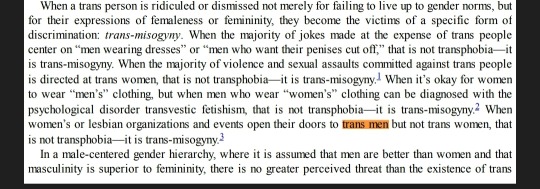
This whole passage has multiple issues, but there is only one I'm going to really focus on today, concerning the very end of the passage:
"When women's or lesbian organisations and events open their doors to trans men but not trans women, that is not transphobia- it is trans misogyny"
From a transunitist point of view, it is immediately obvious that this rhetoric in the quote is one of many needlessly divisive lines which Serano inserted into WG. A rule of thumb for approaching Whipping Girl is to disregard anything she says about trans men, because she often speaks for or over trans men while saying very inaccurate things about them. This is one such example. A transunitist approach here would examine how there isn't only transmisogyny at play when cis women exclude trans women and include trans men, but also transandrophobia. In this post, its my intention to highlight how two arms of transphobia can work in tandem to the detriment of trans women and trans men.
So what would a transunitist analysis here look like? What would we change or reexamine about this example? (Repeated below for easy access)
"When women's or lesbian organisations and events open their doors to trans men but not trans women, that is not transphobia- it is trans misogyny"
I'd propose this analysis:
1. What is meant by women's or lesbian organisations or events? Serano implies they are cisgender run orgs and events. If these cis women's groups are opening their doors to trans men, what does that imply about how those cis women see trans men? With this, is is actually a positive thing that the doors are being opened for trans men? Are trans men benefiting from this or are they actually suffering from this? Isn't the inclusion of trans men who don't want to be in women's events or spaces in those spaces an example of transphobia against trans men (transandrophobia)?
Does the framing of this quote direct disdain towards trans men for being "included" while trans women aren't? As pointed out in point #1, it is cisgender women running these spaces, nor trans men. Shouldn't the disdain at non inclusion be directed at the exclusionary women rather than trans men? Is Serano's anger being directed at the wrong group? Is frustration at exclusionary cis women being directed at trans men?
Wouldn't this sentence work if all reference to trans men were removed? What is the purpose of contrasting with trans men here? Does it achieve anything? Does the superfluous comparison negatively affect trans men?
Now that the background has been laid out, I want to explore how Serano correctly identifies the transmisogyny in the example, but either is oblivious to (or deliberately ignores or downplays) the transandrophobia here. Once we see that there is not one kind of transphobia going on here, but two kinds, we instantaneously have a more complete analysis right off the bat. Hence why transunitism is so important right now.
Serano's impmication is that there are no negative side effects to trans men being included in women's events. Plainly, it is misgendering trans men, first and foremost and is is already transphobia. (However, I will add the caveat this does not apply to trans men who grew up in lesbian spaces before they came out as trans men, who may consent to being in lesbian spaces. The same goes for trans women who were in gay men's spaces pre transition). For simplicity's sake, we are analysing this from the pov of trans men who don't want to be included in women's spaces, but are bombarded with offers to anyway. The bottom line is, the trans men in Serano's quote are often unwilling to be included in women's spaces and are distressed when offers are made to include us under the category of woman, because, you know, misgendering. But Serano either doesn't realise this or downplays trans men's issues to the point that basic misgendering against trans men doesn't register to her. In any case, there is transandrophobia present in this scenario.
The transmisogyny part is obvious, being the exclusion of trans women from women's spaces when they should be included.
Now, imagine if, instead of putting trans men and trans women against each other like Serano does in the quote, we reimagine this scenario's analysis by including transandrophobia and transmisogyny theory to explore how cis women's transphobic exclusion of trans women often comes with a transphobic inclusion of trans men. In other words… Two arms of transphobia intersect to inflict damage on trans women and trans men.
You can see this with other examples, such as when transphobes complain about inclusive language around periods and blame trans women for it. In that situation the first arm is the transmisogyny (blaming trans women for inclusive period language because they're hypervisible as trans people) and the second arm is transandrophobia and/or exorsexism (ignoring that the inclusive langauge is meant to benefit trans men and some nonbinary folk and that the focus on helping these people has been lost, leading to further invisibility/ lack of support altogether).
This post is super mega long by now, but I hope this has been a worthwhile read. I would very much appreciate your feedback about this analysis, I know I can't cover everything in one post, but I'd be delighted to see your takes on this and other people's transunitist takes too!)
215 notes
·
View notes
Text
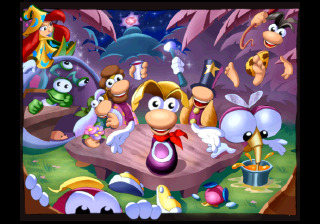
Hello everyone, I simply wanted to see Rayman's evolution, growth and apparently his mental deterioration over time...
things before starting....
>I know something about mental health and psychology, but I'm not an expert....don't take my words too seriously.
>some topics related to the decline of mental health will be discussed, I repeat something about the topic again, but I am not an expert on this, much less a professional, do not take this very seriously.
>I will talk about some headcanons (like Rayman's growth, to give an example), and this is all a headcanon/theory about Rayman's character, so take it as entertainment.
>if you want you can correct me (I may have been wrong on one point about the canon or something similar...I haven't had the great opportunity to play all the Rayman games and know their stories in depth) or contribute to this headcanon/theory, but always with kindness.
>THERE WILL NOT BE TALK ABOUT ORIGINS OR LEGENDS, I consider them as part of another dimension, and they are basically the Rayman from Rayman 1, grown up and without traumas, so we are interested in them for this blog.
> my English is not the best... sorry if you don't understand something....
>THIS IS JUST ENTERTAINMENT AND I DO IT FOR MY OWN FUN
>LONG POST
continue reading below the cut....
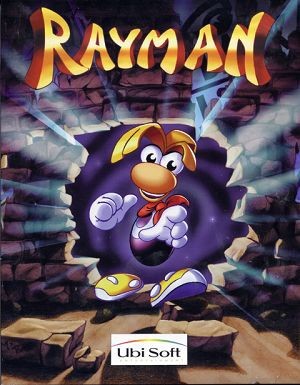
rayman 1 the happy era
You have to start from the beginning, Rayman from Rayman 1, he is a kid who could easily be about 8-10, this is evident from his very childish and small design, as reflected in his Sprites and animations and as he demonstrates all the time. .
Rayman is lively, maintaining an optimistic smile even if the situation he is experiencing is somewhat dangerous, you can see how someone is very optimistic and cheerful, who seems not to take things very seriously, due to the fact that he makes fun of his own enemies ,or does not seem to be afraid of them until the situation gets serious, like a child would do.
To a certain extent he maintains a somewhat innocent and carefree posture, since he is seen not taking Mr Dark's situation so seriously, or not fully understanding the seriousness of the situation, until Betilla is captured, but another important characteristic of Rayman is his good will and heart of gold, since he will have no problem helping the other thingamajigs or creatures he meets along the way, always finding time to help everyone, something worth admiring.
In fact, it also highlights his great sense of empathy, this when after defeating the mosquito he empathizes with it, understanding that he did what he did, out of fear of Mr. Dark and the influence of nightmares.
In general, Rayman has a very fun and happy personality, with a lot of positivity, some innocence and, above all, not taking things too seriously, but his great sense of empathy and sense of doing good without really expecting anything in return stands out. Rayman does not have much development, but it could be assumed that after Betilla was captured by Mr Dark, Rayman would begin to take the matter of saving the world more seriously, although not reaching the level of Rayman from 2 or Spark of Hope.
This Rayman is totally healthy and after his adventure, it didn't have a really negative effect on him, but a positive one since he probably learned to take things a little more seriously, which can be reflected in Rayman 2, and maybe The most that could disturb him was the kidnapping of Betilla or Dark Rayman, better known as Raymesis, due to the fact that he had every intention of killing him, but this really gave him more of a life lesson than a trauma, since he overcame a fear and was able to take things more seriously, and he also solved these problems in a very simple and quick way, without having to suffer real consequences.
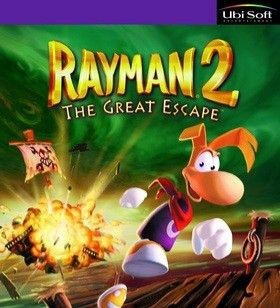
Rayman 2 beginning of the problems....
Rayman 2 is the root of all the traumas and mental decline that Rayman would later suffer... here we can see an older Rayman being about 13-14, age is very important here... since it is childhood adolescence where traumas and emotional wounds can be worse than when they happen to a young adult or an adult, since the wounds or traumas obtained in childhood can leave a very large scar and very difficult to treat, sometimes it even seems that overcomes the situation but out of nowhere it falls drastically....
many will ask what is all this about??? Well, the beginning of the game is already very strong, telling us everything that happened and the horrible things that happened, but even more horrible is the context of the game, that basically the villain won and that hopes are very little.... Heavy for Rayman is the fact that he tried to save his home from the pirates but lost.... since the pirates achieved their goal, destroying the great protoon and basically leaving Rayman without powers or strength, which doomed the world... ..
This is already very strong, leaving Rayman with a great feeling of guilt and remorse, since basically because he was not very strong or capable, he had to see his world be destroyed and enslaved without him being able to do anything, something that was torture psychological for him, considering his sense of kindness and empathy, plus being imprisoned, being treated very poorly, just imagine that razorbear in the game manual tells Rayman that he will make him his most docile slave...we don't know what things He suffered but, considering those words, Razorbear's personality and how they had the other prisoners and even how Rayman himself looked at the beginning of the game, weak without strength or courage, even almost without hope, almost succumbing to Razorbear's will, they do not give good signs...
If you can imagine really horrible things, from psychological torture, like Rayman had to listen to the suffering of others, even see them, without being able to do anything, razorbear reminding him that everything that is happening is thanks to him, putting ideas in his head , also mistreatment from beatings or lack of food or sleep, in addition to the fact that imprisonment is already a very heavy thing in itself, imagine that being a child, it definitely left many emotional wounds.
and all this is just the tip of the iceberg since we haven't talked about the caves of nightmares and Yano and how he totally traumatized Rayman by wanting to eat him alive and his contradictory personality, or the fact that on this occasion the risk Dying is more latent for Rayman, or constantly seeing the pirates' strangers in his beautiful home, etc.
It is really worrying about all the psychological and physical damage that Rayman suffered in this installment...it is really very terrifying and alarming to think about all that...just consider that one of these bad experiences already leaves serious damage. , which would require months or years of therapy to overcome normally.
Speaking of Rayman's personality in this adventure, Rayman proves to be more serious and somewhat lost in his thoughts, which is not surprising considering what he is experiencing, although he still has innocence, demonstrated as when Ly asks him about Polokus and He very honestly and innocently answers "NO".
He also follows his big heart of gold and sense of pure empathy, as he continues to help those who need it and even in this serious situation he tries to give some positivity, but not by lying or trying to cover the sun with a finger, but by giving hope that everything will improve, since although he has suffered a lot he is still not willing to give up until he breathes his last, which encourages others.
You can also see a braver and somewhat mature side of the character, since he is often fighting against his own fears, he knows first-hand how capable Razorbear can be and the world has become a dark place where almost everything can kill you if You are not careful, so fear is constant in Rayman as he himself expresses it to globox, but he still faces his fears for his friends, something very noble on his part, he often speaks from his own experience supporting everyone who needs it, giving emotional support as you see he does with globox or ugleta or his babies, it is also seen that he no longer gets distracted or makes fun of his opponents, he walks with his feet on the ground.
He also has a great will, since when he finally defeats Janus, he rejects the temptation of gold and leaves all the suffering for the past, leaving his world to its fate, another thing worth admiring about the character, although we also see sadder sides. or the character's despair, like at the beginning of the game, as I mentioned, he is totally sad and almost without hope, but it is globox who returns them to him when he arrives so that Rayman can finally hug an old friend.
In fact you can see all his joy and happiness, when he finally sees him demonstrating the great affection he has for his friends and how important they are to Rayman, you can also see how he celebrates when overcoming certain obstacles which shows that he still has something of childish joy in his being.
Basically Rayman shares many characteristics with his younger self, with the difference that he is in some ways more mature than the younger version of him.
Although here Rayman suffers a lot of emotional damage, he also learns things, such as bravery and seriousness and total concentration, even though here he suffers much more emotional damage from the entire saga....damage that will leave him with really serious marks, which could cause depression. or a big change in your way of being, or other problems such as some self-hatred or a lot of insecurity and cases of anxiety in addition to the most obvious post-traumatic stress, really serious if not treated properly....
okay, a publishing error forces me to separate this into parts, plus I think this is already a little long and I better let you digest everything I just said about Rayman in its second installment, you've probably never thought about it very deeply in those things XD
#rayman#rayman fandom#rayman 1#rayman 2#headcanon#foxy talk#rayman in the phantom show#rayman legends#rayman origins
50 notes
·
View notes
Note
I fear Ted might go back to Kansa because of Henry and because Dorothy leaves Oz and Mary Poppins goes back to wherever she came from, so if the series does that, I couldn't really say it came out of nowhere, but I'm also really hoping as hard as I can that it isn't the case, because Ted needs his found family and friends, and thinking about him alone in Kansas (even with Henry and Beard) just breaks my heart, so I wanted to say I really loved reading your meta about it!!!
I'm so glad you liked it, anon! Honestly, it's nice to hear that I'm not alone in thinking this. There's been so much meta lately arguing that Ted will go back to Kansas - which, as you say, I think is both likely and something the story has set up long term - but it doesn't feel like many fans are talking about whether he should. Given how focused the show is on these bonds and the growth everyone undergoes... damn, it would feel really bleak to me if Ted were to simultaneously leave the community and effectively go back to where he started: Kansas, (American) football, a rocky relationship with Michelle, Henry. I'm just imagining a finale that carts Ted off to where he's not only got to deal with everything he's still got going on (anxiety), but also is smack-dab in the middle of new struggles (many more "Who's playing dad and giving Henry money?" interactions + "Oh yeah, I'm perpetually reminded that my former therapist broke his professional oath and is dating my ex 🙃"), all without the support system he's built. Maybe he'll have Beard with him but god, that's so depressing to me!! I'm praying the writers have picked up on all the negative implications here and the return setup is just a red herring... but I'm preparing myself for that disappointment. Unfortunately, Ted Lasso would not be the first show that got caught up in the idea of a circular ending, not realizing how much that undermines the core messages at play...
Also, I just want to highlight some of @queen-mabs-revenge tags on the post. I didn't have the energy earlier to delve into the intricacies of why the Mary Poppins parallel doesn't work for me, but this lays it out succinctly:
#fr the mary poppins point like the metas are great but it's the idea of it that just deeply depresses me#bc honestly in mary poppins — it's not about mary poppins when it comes down to it#you don't really learn anything about her life because it's not about her it's about the family she leaves behind#like it kind of would feel like a slap to be brought so deeply into ted's inner life and journey for them to pull a mary poppins#like part of the reason why it's ok when mp leaves is bc she's already practically perfect in every way#she doesn't need the family so it's ok for her to leave#you're not invested in her character growth bc she doesn't really have any#that very much doesn't translate over to ted's story!#he needs the richmond fam as much as they need him#it's qualitatively different!
Bolded for emphasis because YEAH. THAT. Mary Poppins is almost more of a narrative device than she is a character. Which isn't to say she doesn't have personality, but that she exists to forward the growth of the family she visits, not develop herself. That is explicitly NOT who Ted is. In fact, the show has gone out of its way to say that Ted's tendency to put everyone else before himself and power through life with an endlessly positive, one might say "perfectly perfect" way is deeply unhealthy. He's had a whole arc about unlearning that! So to have him just leave like Mary Poppins does... oof. As for the Dorothy parallel, that just feeds into what I was arguing in the original post: Ted no longer thinks that there's "no place like home." You can love and miss a place deeply while recognizing that it's no longer where you need to be and I very much think Ted has hit that point in Season 3.
Plus, uh... there's the fact that Dorothy's journey is all a dream and she/the audience realizes that every loved one she "left behind" was really just a fantasy version of the family she already had. Dorothy was only and always going home to her family, not leaving a new family because they're one-in-the-same. Ted would just be leaving, period. There's no real - and therefore superior - version of Rebecca, Roy, Trent, Higgins, Keeley, Nate, Mae, and all the boys waiting for him in Kansas.
24 notes
·
View notes
Text
Xehanort is a character that I have... complicated feelings about.

I truly want to love him, and on paper he has a lot of qualities that I typically like in villain characters. Buuuuuuut...
(This a long and spoilery post, so it’s under the cut!)
In a lot of ways, Xehanort is very similar to the character of Palpatine from Star Wars. I just recently posted a very long, rambly, half-coherant post about how much I love Palpatine and how he checks all the right boxes for me in what I love in a character. I actually just now, a few minutes before typing this, realized that Death Battle even did a Palpatine vs. Xehanort episode... which is pretty cool. I’ve compared the two in my mind for a long time... but, in my opinion, Palpatine is Xehanort done RIGHT.
Don’t worry - this post will NOT be a comparison between the two characters, I only bring this up because a lot of the positives I’m about to highlight are also positives I see in the character of Palpatine, one of my favorite characters of all time. So despite any negatives I’m about to talk about, the potential is most definitely there for Xehanort to blow me away and become one of my all-time faves.
If you are a fan of Xehanort, please don’t come at me with hate or anything like that. Honestly, I want to like Xehanort. There is a reason I’m posting this in his tags - I’m not trying to hate on the character or say he is bad, I’m just laying out my issues (AND the things I like about him!) and why I think he could have been done SO much better. So if you have reasons for loving him, or have respectful counter-arguments to my points, I would love to hear them. Maybe, and hopefully, you can change my mind and make me love the character again.
Xehanort’s past is given to us very slowly, bit by bit, layer by layer, which I actually rather liked. With each game, you learned more about where he came from, what he was up to, what he wanted. Xehanort’s story is one loaded with manipulating everyone around him, finding young people to mentor before slowly corrupting and possessing their bodies, remorselessly discarding people that no longer serve any use to him... all qualities that I LOVED about Palpatine, and his status as a manipulative mastermind type of villain. Xehanort is the one personally responsible for pretty much all of the events of the Kingdom Hearts series.
I love characters, especially villains, that take on mentorship roles. Mentoring youth is a topic that carries a lot of weight and personal relevance to me, and I find it fun to explore all facets of that, even with villainous characters that inject toxicity to those relationships. Exploring how those types of relationships can go so wrong, or even exploring the good that may come out of otherwise irredeemable sociopaths through their mentoring. And Xehanort has a lot of these.
Xehanort manipulates Terra into believing he is the only one on his side, acting caring and supportive, only to eventually possess his body. He takes on Ventus as a pupil, and when Ventus proves to be too soft for what Xehanort has in store, he unlocks his dark side in Vanitas and takes him in as a pupil instead, manipulating the two boys to eventually clash for his benefit. He begins to offer guidance and support to Riku, only to possess his body as well. He takes on disciples in the form of Organization XIII, misinforms and practically brainwashes them all into doing his bidding, and begins a process to eventually - you guessed it - possess all of their bodies as well. He manipulates all of these people, and every iteration of Xehanort is campy, dramatic, and fun to watch. He even eventually makes plans to turn Sora, the hero of the story and his greatest enemy, into one of his pawns and new bodies.
All of that is AMAZING, and lays the groundwork for a really compelling villain.
It’s also worth noting that Xehanort DOES have something I love that Palpatine does not; the ability to transform into cool final boss forms. The final boss sequences of Kingdom Hearts and Kingdom Hearts II, and the crazy forms that Ansem and Xemnas take on, are highlights of the entire series for me. Even Kingdom Hearts III’s final boss sequence kiiiiiiiiind of counts I guess, though I found it disappointing compared to the others. Give me giant monstrous dragon-esque forms over a suit of armor any day!!
My main issue is.... there’s a point where Xehanort stops feeling like an actual character, and starts feeling more like a lifeless plot device?
Throughout the series, we meet many different iterations of Xehanort. At first, most of them pop up one at a time and that’s fine. But then, as the series goes on and time travel becomes a thing, all of these iterations start showing up all at once, all doing different things and all effectively acting as their own unique characters.
If we take out the Organization XIII members that are far along on their “getting possessed” journey and just have some Xehanort influence on their own personalities, and JUST count the different iterations of Xehanort himself, we haaaaaave....
Young Xehanort, who is Master Xehanort as a youth. This is the iteration that introduces time travel and starts all of these iterations acting independently and existing all at the same time.
Master Xehanort, Xehanort’s “true” form and an old man.
Terra-Xehanort, Master Xehanort possessing Terra’s body. He gains amnesia and begins acting as Ansem’s lab assistant, but it is speculated (but not decisively answered) whether he actually has amnesia or if it’s a ruse.
Ansem, Seeker of Darkness, Terra-Xehanort’s Heartless, who goes on to possess Riku’s body. He also steals the real Ansem’s name to make things just a little more plot twist-y and convoluted.
Xemnas, Terra-Xehanort’s Nobody. Honestly, I’ve come to think of him as probably my favorite of Xehanort’s iterations - he shows so much manipulation in his dealings with Organization XIII, he fights by flinging freakin’ BUILDINGS at you, he has two red lightsabers to REALLY cement the Palpatine comparisons, HE is the iteration that gets closure on Xehanort’s history with Ansem the Wise... Of all of these iterations, Xemnas is the one that, to me, feels the most like Xehanort’s successor in the overall narrative.
For most of the games of the series, only one iteration of Xehanort showed up at a time. Ansem and Xemnas existed at the same time due to the nature of Heartless and Nobodies, but they are met and dealt with completely independently in different games. No big deal. But when time travel becomes a thing, and five different, unique Xehanorts are running around with personalities and relationships of their own, not to mention all of the other characters with a piece of Xehanort inside of them that are beginning to adopt his ambitions and philosophies, things start to feel really muddled. And that’s not even counting things like his secret “No Heart” armored boss fight and things like that.
Can Xehanort be considered a character if he is actually somehow multiple faces, multiple personalities, multiple identities, multiple characters at once? You have to go through so many character pages on the Kingdom Hearts Wiki just to get this one character’s full story and history.
I feel like Xehanort - XEHANORT, the big villain of the series and amazing manipulative mastermind extraordinaire - can’t really be a favorite character. He almost feels like a concept. An idea. Each of his individual parts all feel like fully fleshed-out, complete characters worthy of being a favorite, and sure, they do each carry certain traits in common... but they all have completely different personalities, different quirks, different faces, different voice actors, different relationships with different characters, different abilities and strengths, different weapons... is it really fair to say that all of that is just one character? It almost feels like it’s cheating.
For most of the series, all of these different iterations led into each other, mapping out just how deeply Xehanort’s manipulations and possessing went. When you consider each version of Xehanort to be a different chapter of his story, it still worked. But when the last few games messed with time travel and made all of these forms independent of each other and coexisting, each one continuing the relationships and feuds exclusive to each of them, it just starts to feel muddled and confusing. I would have much rather seen one form of Xehanort bouncing around and causing havoc to all of his old adversaries and pawns, having the memories and experiences of all his former selves, to tie all of his iterations together and add to his continuity. Instead, the series decided to add to the continuity of each individual piece of Xehanort and give each of them closure independent of each other, which does a disservice to Xehanort as a whole.
I’m probably overthinking this. I love Kingdom Hearts. A lot of my favorite gaming experiences ever came from the Kingdom Hearts franchise. I have a lot of fond memories of the series and its characters. Roxas and Axel/Lea are particular favorites of mine, and I’ll always love the series for incorporating Disney characters - especially the Disney villains. It just kills me because Xehanort has so many things that, on paper, would guarantee him a spot on my list of favorite characters of all time. I just can’t get over that hurdle of feeling like he is more of a concept than a character at this point. All they had to do, I feel, was give Xehanort one “self” to fuse all of the past Xehanorts together and give the overall character a sense of continuity and closure, instead of reviving all of his past selves separately.
When the final battle of Kingdom Hearts III happens, it feels like we are taking down Master Xehanort, the antagonist of Birth by Sleep, NOT the antagonist that has been plaguing us throughout the entire franchise.
26 notes
·
View notes
Text
The importance of media on society's mentality
The importance of media is an essential topic to discuss. The media influences a big part of the world, and their opinions are one of the most powerful nowadays.
There are a lot of vulnerable people around the world, who don't have access to quality education and get in touch with some kind of media. They are frequently subjected to have positions changed or modified by what they see in the news, advertisements, etc. Although this process is usually slow and gradual, it is very effective.
One of the classic examples is the role media played during World War II. The German government used it as an instrument to get support from the popular layers of society. For instance, the United States Holocaust Memorial posted an article about this topic, highlighting how media were used by the Nazi:
"In the summer of 1941, German newsreels featured horrific scenes of Soviet killings of Ukrainians, Latvians, and other nationalities; these atrocities were falsely attributed to Jews. Nazi propagandists crafted the film clips into antisemitic morality tales and accused the local Jews of committing crimes for which they had to be punished."
Unfortunately, this is only a simple example. Media resources were also effectively used to blame the Jewish community for Germany's economic and social instability; besides to put responsibility of the black plague epidemic - that happened in the fourteenth century, on Jews. In this sense, without the media, all the persecution they suffered would probably not have taken all the proportions that it took.
But does it mean that the media is bad for our society?
Definitely not. Let's firstly remember that media is a very broad term. It includes television, social media, newspaper, radios, general ads, etc. Considering this, it's safe to say that most of its negative effects, encompassing misinformation and hate speech, can only be easily spread if the population is not prepared to check all the information they get. This includes the absence of a critical view and interpretation on information they get.
So, as a society, we should do our part to guarantee that people get the knowledge they need to stop having their point of views changed by the media so easily. That's where the critical eyes enter in the story.
To conclude, we can say that the media has two main sides: it can be really good if used to the right purposes; it can be really bad if used in favor of the wrong ones. All of this because of its huge power on shaping the minds of the people around the world.
Work Cited: United States Holocaust Memorial Museum. (2001b, November 1). https://www.ushmm.org/
1 note
·
View note
Note
This feels like it's a hot take but it shouldn't be... IF tools all have positives and negatives and there isn't one perfect one... It's great to discuss the pros and cons but it feels like a lot of people are more interested in saying the one they like is the best. It's tiring 😩
Agree 100% with you there, Anon! (even as a SugarCube die hard girlie :P)
I've gone through threads (probably out of morbid curiosity) where people where debating in circle about some system. It can go on for pages because no one will realise that all have been said, or someone has to add their point (which is the same as 10 posts ago), or someone just want to fight everybody, etc... It's very entertaining, even if a bit of a waste of time/energy... Imagine what could happen if that energy was spent of helping fix said program....
People will always promote their favourite/the one they are most comfortable with - I don't think I've seen someone promote a system they hated.
In any case...
Did you know the IFWiki accounts for over 80 different authoring system (which does not account for formats within said system, because Twine has over a dozen) ? and this list is probably not even exhaustive !
There is a lot of choice out there, and you are correct, none of them are perfect. No system can ever be... One will be easier to code with/learn how to code but have barely customisation, another have the reverse (long/steep learning curve); one will be really fun to play with but have a terrible documentation, while another can have very thorough/organised documentation but coding is a pain...
What is important is finding the best one for you! Anyway, SugarCube is the best, fight me... /jk
[Old tags in comments: I like to dunk on Harlowe a lot; but honestly it's not a bad format at all! Most Twine projects happening in SugarCube could be made in Harlowe not problem; and look as fantastic! Hell even transitioning to Chapbook could make it easier for a lot of creators! Chapbook has a syntax highlight like Harlowe and a sleek UI and a pretty good documentation One Chapbook game was in the top 20 of the IFComp last year! And a Harlowe Game was 2nd! And I'm here trying Adventuron this month…. /]
some rambling below about a perfect system
I do wonder what a perfect program would be, considering how large IF is:
there should be both options for parser/command input options and hypertext/clickable choice
but also make it possible to cross all genres of gameplay (puzzle-y, escape room, RPG, Combat, drink-mixing, etc...)
the output/final product should be accessible (screen reader/page customisation/keybrinding/mobile support...)
there should be a pleasant enough base UI, but also the easy possibility of changing it easily, including text formatting: maybe even some built-in UI for a more parser feel, or VN one, etc...
you should be able to include assets (music/image/etc...)
it should be possible to have your code hard to access in the final product (this is the case for most parser program, not so much choice-based; but this can affect the accessibility points)
the program should also be free of access, open source, and commercial licence free
the coding should be relatively easy but can also be as complex as you might want
it should be possible to include add-ons/plug-ins/custom code (and maybe even other language libraries)
the documentation should be clear, include a multitude of examples, easily accessible and searchable
But no program could check all those boxes. A lot is contradictory, and I would suspect someone managing to make all this happen and more would want to have their work compensated. Especially since most of the time, this is done by one person, and one only, on their free time, and for no expected return!
Hell, even programs with paid-licences can be shit.
1 note
·
View note
Text
aaaaahhh thank you for covering Moon Kings!! sooo many thoughts about these issues. and thank you for addressing the really difficult aspects of Marlene’s character here. i love the Moon Kings two-parter issue for many reasons. it gave us Jake owning more of who he is by putting his moustache on for the first time. decades later in Lemire's run, it would inspire Captain Spector (a fictive introject of Marc's toy Blast-Off), who fights the werewolf war on the moon.
but ... as you've touched on here, these positives are countered by the negative of how Moench has written Marlene, especially in these issues. intimate partner abuse is unfortunately a very common experience for systems who enter into relationships. and the relationship that Moench is writing between Marlene and MK System *is* abusive. and in this issue it goes from emotional abuse to physical abuse .. and there are parallels to be drawn to domestic abuse involving substance use (yes Marlene was dosed by the bad guys without her knowledge, but the implications are still there). and in these issues, Marlene is also written as somehow "catching" plurality? which carries sooo much stigma on its own. and her experience of plurality is linked directly to her violent actions. this gets wayyy to close to "evil alter" territory.
one of the main problems with Marlene's character is that she is supposed to be the "normal viewpoint" -- the eyes that we witness Moon Knight through. she is written in the same way that Kay is written in the Godfather movies. she is the smart, tough, and educated "everywoman" who is witnessing the protagonist become more and more of who they are. she is brought into their world, and as she delves deeper, she becomes more like them, but she wishes they could be the partner she'd wanted .. not the one she got.
this narrative device might work for Kay witnessing Michael Corleone take on the mantle of Godfather, but when it is applied to MK System, it forces a parallel between DID and deviance. unlike characters like Michael Corleone, MK System aren't descending into a life of debauchery and crime (no matter how cavalier their superhero methods may be from time to time -- cue the panel of Marc "testing" the cocaine to make sure it's real ... Marc, no!). quite the opposite. they are ascending to a place of figuring out they're a system and learning how to communicate with each other.
and yet at every turn, Marlene belittles and abuses them for being plural. she constantly interferes with their system communication and dynamics. at the very beginning of the 1980 run, she tries to force Steven to switch in when Moon Knight is in a dangerous fight with Bushman. for the most part, she refuses to acknowledge anyone in the system other than Steven, to the point where Jake starts calling her out. as you’ve mentioned in your post, there are many instances when he tells her that he's not Steven, he's Jake, and he is clearly irritated at her refusal to accept this.
and .. if Marlene is the Kay to Marc's Michael, then Moench does intend for us to sympathize with her. we are meant to think, "this poor woman, look at what she has to put up with, no wonder she calls them 'crazy' (and much worse) from time to time". her emotional abuse is horrible and wrong. no matter how frustrated she may get, she has no right to belittle and mock her partner in the way that she does. because in the context of a domestic partner interacting with a system, what Marlene is doing *is* abuse. but Moench effectively tries to convince us that she's in the right.
the Moon Kings issue contributed a lot to Moon Knight canon, and it's an important part of the original series, but i think it really does highlight the problematic aspects that Moench wrote into Marlene's character.
Breaking down the comics: The Insanity Plea.
Moon Knight, Issue #7: The Moon Kings.

OKAY. I was not going to include this issue in the list of important ones. It's a weird one. (there are a lot of weird ones. This hardly ranks in the WEIRD list, but it's still weird).
And then I saw the first page.
Ladies and gentlemen, I give you: JAKE LOCKELY.
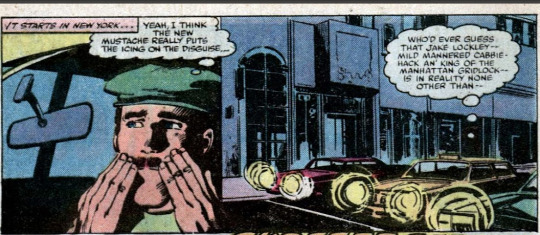
This is epic. Last issue we have Steven becoming aware and I will argue that this is the exact moment that Jake became aware of himself being not Marc.
LOOK AT HIM. The care he takes to put it on. The way he looks unsure in the mirror, not sure if he's going to like what he sees. If the image there will match what he feels inside.
Still calls it a "disguise". Jake honey, there's no disguise. No one cares enough about Moon Knight to do anything with a 'secret' identity. And anyone that does care already knows who Moon Knight is anyways! (they all think it's Marc. Marc just has that rep).
Denial.
So this issue opens with Crawley running to Jake with news on the street about some new drug that's capable of destroying a city.
Where is this drug hailing from? Chicago. Seems on the next full moon, they plan to unleash this drug on Chicago.
Jake calls Marlene from his cab radio.
"Who - Oh, Steven -- I was just going over your stock portfolio and --"
"Stow the Steven Grant Jive, Lady -- I'm still Jake Lockley at the moment. But speaking of your precious pretty boy millionaire... Book a room for him and a companion at the Drake Hotel in Chicago -- And two singles for Frenchie and Mr. Bertrand Crawley, Esquire."
Jake's getting a little 'tude when it comes to Steven.
Is it resentment? Possibly. Jake's lifestyle is completely at odds with Steven's. Perhaps Jake feels that Steven could be doing more to help people. He spends all his time with the poor and downtrodden while Steven relaxes in the mansion.
His feelings about Steven do start to widen the gap between the three men and it will become a problem in later issues.
It also makes me angry that later authors took the Marlene relationship with the three boys and made it between Jake and Marc.
Marlene did NOT like Marc and Jake was often at odds with her. If Marlene was going to go running to any of them and have a child, it would have been with Steven and I'm so angry that the writers completely forgot about Steven and made it with Jake.
All that being said, the very next panel has Marlene completely ignoring Jake:
"We're going to Chicago together, Steven? That's wonderful! But--"
"Grant'll be home after I scarf some of Gena's chow. Ciao."
Jake hangs up.
"The Lady's a gem. Grant don't deserve her."
It's really hard to tell whose side he's taking there. Is he being serious and ragging on Steven again? Saying he doesn't deserve someone as devoted as Marlene? Or is he saying that Grant actually doesn't deserve someone that refuses to listen to them?
The debate is real.
Back in Chicago, we see some suspicious men pouring barrels of a drug into the city water supply and the next morning, we see unsuspecting citizens drinking the water.
We then start to see people freaking out, becoming feral and attacking other people.
Flying into Chicago, they get reports of people freaking out and causing riots. Moon Knight heads down to try to stop the fights while Marlene heads to the hotel, Frenchie keeps in his chopper, and Crawley heads off to find out what's going on.
Frenchie stops at a water fountain for a sip after a little investigating then heads back to the chopper.
Whoopse.
Frenchie freaks out mid flight and crashes the moon chopper into the water. (Someone start the crashed chopper count.)
Marc watches in horror as his only friend crashes and he dives in after him.
***That's not how you do CPR MARC***
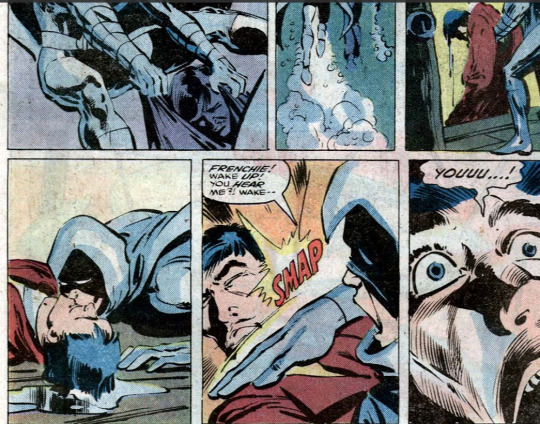
So Frenchie wakes up and instantly tries to kill Marc. Marc knocks him out and ties him up. Marc has now figured out that the drug is in the water.
He puts Frenchie in a safe location. "I'll be back for you, Frenchie. If I have to fight my way through every madman in Chicago--I'll be back!"
I stress again that Frenchie is Marc's only friend that has stuck by his side through hell and back. Even through his mental health breaks and strange life style.
You have to wager that Marc has a soft spot for Frenchie. He knows how important he is.
He rushes to the hotel on foot so he can warn Marlene not to drink the water.
Marc tries to call Marlene from a payphone but mid warning the operator freaks out and cuts the call.
Annnnnd Marlene drinks the water.
But Marc has bigger issues as mobs of affected people show up and try to beat him up.
Meanwhile the drug makers put on werewolf masks and declare themselves leaders of the city and command the affected to burn it to the ground.
He then makes demands for money or he'll destroy the city, effectively holding the city hostage.
Marc tries to take out the leader and chases him down to the subway where he gets gassed by the concentrated dose of the toxin.
Marc does not have a good time.
He hallucinates a sign to read "Moon Kings" and thinks he's on the moon being attacked by moon monsters.
Meanwhile, Marlene is in the hotel freaking out. She starts calling for Steven and saying she doesn't know who she is anymore and blames him for making her crazy like him.
It's.... It's not a good look.
Yeah, I get it. She's on drugs. But considering earlier she made a joke about how Steven doesn't know who he is and it's going to drive her crazy too....
Issue #8: Night of the Wolves.
This cover is pretty famous as Moon Knight goes and it's been redone a few times for varient purposes.

Yeah, Marc is still having a bad time. He starts to hallucinate that the subway train is a monster and he has to kill it.
He manages to sort of snap out of it and saves some people on the train from being killed by others affected and then stops the train before it crashes.
The fact that Moon Knight isn't as affected by the drug or is fighting it off is one of the first instances where you see how Marc isn't as affected by mind altering drugs. Something Marc loves to brag about when facing telepaths or villains that try to mess with his state of consciousness.
Marc manages to find Crawley and he's still not having a good time telling real from hallucination.
Crawley is not affected! Because he's only been drinking booze.
Look, I'm not a huge fan of this particular issue, for reasons I'll get into in a moment... But it did give us this:
******There was a sewer man****
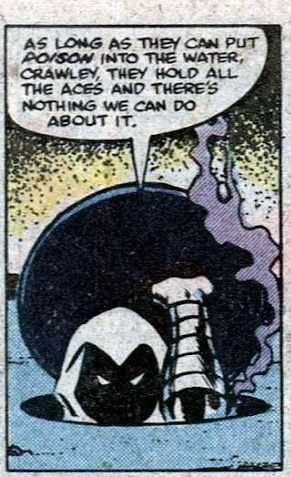
(Someone start the sewer count)
So they make it out and Marc makes it back to the hotel to find it ransacked and an affected Marlene waiting to kill him.
She stabs him and runs back into the dark, ready to stab him again.
"No Marlene! Don't do it! I'm Steeven! I love you, Marlene! I... I love...you..."
What strikes me about this is that he remembers times of him kissing her as Steven. He knocks her out and pauses.
Steven Grant just declared that He, STEVEN GRANT, loves Marlene.
He ties up the unconscious Marlene and is clearly conflicted about leaving her. Crawley shows up and informs him that he found where the bad guys are.
Moon Knight arrives in time to see a shit show.
The cops are at war with them and the mob is attacking and the bad guys are trying to get away.
Moon Knight is injured from being stabbed by Marlene, and the military has shown up ready to put down the riots.
The bad guys are about to dump the last of their drug in the reservoir and Moon Knight tackles them!
An epilogue ties it all up at the end: "After three days, the shoulder stab wounds are healing quite nicely and Chicago's lakefront skyline looks almost serene."
The drug is wearing off and the water is being purified.
We see the group gathered at the water watching as the mangled Moon Chopper is pulled from the lake.
What a way to get a new chopper design.
The writers admitted that they fell out of love with the original moon copter design and really wanted to redo it so they…crashed it and started over.
This becomes almost a rolling gag because that chopper is constantly crashing, blowing up, and landing in buildings on people.
So why am I not a big fan of this issue? Marlene. She takes a lot of pot-shots at the boys in this one.
While the boys have been slowly advancing and figuring themselves out, becoming more separate, and finding their own individualism, she has been pushing back.
One could argue that she’s afraid. She doesn’t understand what’s going on and she sees Jake getting more time away from her and enjoying himself, Moon Knight taking more time to be out all night, and Steven even starting to find his own interests. What’s left for Marlene?
On the other hand, Steven’s sudden realization that he loves Marlene is also a big step. He himself loves her. Not Marc or Jake or Moon Knight. He has his own feelings.
I also dislike how the “Look I’m crazy and you made me crazy” aspect is used, even if it is used in a ‘she was drugged up’ sort of way, because it seems to reflect something she was afraid of. As if she’s seeing what’s happening to the system and worried it could happen to her as well.
This is a BIG problem in the mental health community. People have long feared that things are contagious and that they will be hurt by those that are not of ‘sound mind’.
And having everyone ‘go crazy’ in this issue and having it lead to them being hyper violent really puts me off.
Though, one point in favor: The one person that doesn’t ‘go crazy’ and hurt people is Moon Knight. He shows restraint when fighting the people that are attacking him. He’s worried about hurting them. He sees through the hallucinations and knows that what he is feeling is not his own.
At this point, does he consider his brain to have been touched by a god and molded to resist these things? Or does that come later with one of his many many dealings with Khonshu and death?
Or has his brain been affected by Khonshu at all? Perhaps there is more to it than Marc understands (not a far stretch since Marc is not the brains of the operation). Could it be that having DID protects his mind?
After all, DID is formed as a trauma response to protect itself. “You were the only real super power I ever had.”
#aaaaahhhh so many thoughts#i love your moench deep dives so much#these are giving life rn#moon knight comics#moench sienkiewicz#abuse tw
25 notes
·
View notes
Text
So I recently started a new job, and it’s similarities are scarily accurate to a job I used to have a few years ago, and I kinda wanted to just... note stuff down and point out how bullshit a lot of the ways life works is.
Place #1
A few years ago, I was doing an admin apprenticeship in this factory. I’m not going to say exactly what it was doing, but I was part of the tiny office team that was three people plus the boss. Now the boss, we’re going to call him Jeff, had started the company all by himself in his garage 25 years ago and had built it from the ground up.
Now our dear Jeff treated me like s h i t.
He treated all of his employees like they were so far below him that they were dirt on his shoe. I was being paid apprenticeship wage, and he was forcing me to do unpaid overtime despite the fact that I already worked 40 hours a week.
They didn’t actually allow me in the office to do my apprenticeship work most of the time, so in the 3 months I was there, I fell super behind on the qualification I was meant to be doing, because they always had me doing menial work in the factory part of the company instead because I was cheap labour.
I was meant to be doing admin, but they found out about my major phone anxiety, which partially comes from me having APD, which for me personally makes phone calls super hard.
I wasn’t allowed to talk to ANYONE unless I was spoken to first. I couldn’t have a basic conversation with anyone, even the people my age there. In the second week of me working there, I had a friend unexpectedly pass.The fourth week, I bit into a cereal bar and my tooth shattered. My dentist was a 3 minute walk away from my work, and I was bleeding quite heavily and the majority of my tooth was gone. They wouldn’t let me leave to go to the dentist because “You’re already here and we’re paying you to be here”
The sixth week, the Manchester Bombing happened, and I had a friend pass away at that attack. They had the radio on repeat, and every 10 minutes the news station was saying my friends name. I asked them to turn the radio off and put some music on because I was really struggling to deal with it, and I was told I was being childish and I had to get over it, less than 24 hours after I’d had a second friend die in a short amount of time.
I had a medical emergency while at work, they accused me of faking it, and when I eventually passed out and ended up being rushed to hospital in an ambulance, they told me that if it happened again, I would no longer have a job so I’d have to ‘think about my priorities’
It got to the point where I was very suicidal, I was lost, I couldn’t find myself anymore and my job was stripping everything from me. I went to talk to the job centre about it, because in the UK, if you quit a job, you get ‘sanctioned’ from any unemployed benefits for 6 weeks because you purposefully made yourself unemployed. I had a breakdown in front of my work coach.
They told me either I had to go back there right now and quit, or they were going to go up and quit for me. I’ve never known a Job centre do this before, but they were serious about me leaving, and I wasn’t sanctioned for it.
Fast Forward 3 years later.
Place #2
I started this job 2 weeks ago, so this is all very new, but here are where the similarities both start and end.
This office I am currently working in is a 5 minute walk away from the previous place I worked at 3 years ago. Literally on the same street. It is a company that my current boss, let’s call him Jeff because this man and my old boss have the same name, started in his garage nearly 25 years ago and built up by himself from the ground up.
I am paid minimum wage during my probation, which is 3 months long. When my probation is over, I get a pay-rise, and I will every year after that as long as I keep proving myself.
He treats us like his own children. Jeff refuses to call us his employees. We’re his colleagues. If we catch an error before it goes out to a client, he will give us a bonus for saving his company those issues. Every friday, he buys us all breakfast, and he’s told us newbies not to be shy, because he wants to look after us.
Once a month or so, we will close office early on a friday and go to the pub around the corner, on work time so we’re getting paid to go, and he buys us all a drink to thank us for the hard work we put in.
I asked him yesterday why, and he told me that we are the bread and butter of his company. We put ourselves under so much strain and so much stress to do a good job for him, so he’s rewarding us the best way he can. We get paid time off if we’re sick, and I mean proper, full pay. Not sickness pay, as long as we’re not taking the piss with it. It doesn’t matter what it is. He understands we have bad mental health sometimes, and he isn’t going to penalise you if you need a mental health day.
He pays everyone a fair wage, more than fair, regardless of our age.
He will take us all out, fully paid for, for days out after we do a big job to keep spirits high. He encourages us to talk and socialise, because we’re his family.
I’ve never felt more welcome at a new job. I’ve been there two weeks, and I’ve never had a better boss.
This man is in his 50s, and he’s the most caring, understanding boss I’ve ever known. His company is 28 people big, including himself, and he looks after us all, he remembers little things about all of us, and he makes sure we can all get paid enough to live and have luxuries that I’d never been able to afford before.
If Jeff can do it, with a company he runs all by himself... what are big corporations excuses? That make billions and billions yet still treat their employees like shit?
If Jeff can do it, what’s the other Jeff’s excuse for how I was treated? How I was paid? How I was made to feel like shit on his shoe?
These two companies are a 5 minute walk apart. My new job is literally directly next door to my dentist’s. They were started by two men with the same name, the same amount of time ago, who both wanted to make a name for themselves.
But they couldn’t be more different.
#tw suicidal mention#tw manchester bombing mention#really this post is a positive one but it does highlight a very negative point in my life#It's only been two weeks#but I'm so so happy where I am right now
1 note
·
View note
Text
The Perfect Closure of EreMika
The title is pure clickbait (as always), there will be lots of tags (as always) and this post will be huge. As always. So, let’s examine and evaluate the perfect conclusion of the most important relationship in Attack on Titan. We will analyze why this is the best conclusion they could have gotten and of course we are going to talk about what their scenes meant for their relationship, their feelings for each other and the themes of the story.
First, let’s ask the question: What was the purpose of this chapter? Ending the fight obviously, but also giving closure to the relationship between Eren and Mikasa. Now, there were 3 questions that needed to be answered in order for the two of them to have closure.
Why did Eren say to Mikasa that he hated her?
What does Eren feel for Mikasa?
What would have happened if Mikasa had given Eren a different answer back in chapter 123?
Isayama answered all 3 of them in a spectacular way. Let’s see how he did it. The chapter literally starts with Isayama, via Mikasa, setting up the closure. This was achieved by having her wonder if this really was the end for her and Eren. Could it be that their last interaction ever ended with him saying that he hated her?
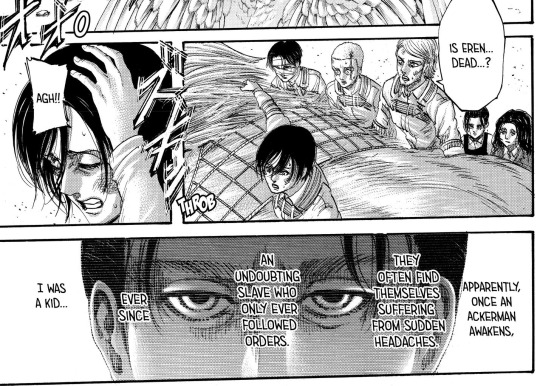
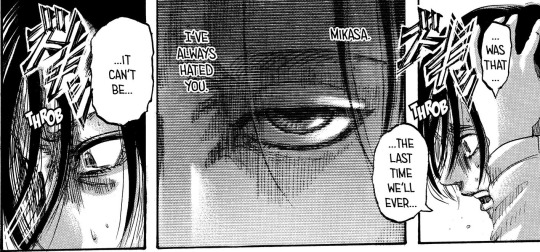
Isayama answers that with a big, fat NO.
That’s the purpose of Mikasa’s vision. Mikasa’s vision is not there to introduce us to Alternate Universes or to portray her as a delusional fangirl that can’t cope with reality. It’s purpose is to answer the above 3 questions. And that it does.
Essentially, Mikasa’s vision is a “What if” scenario. If Mikasa had chosen the ideal for her answer back in chapter 123, Eren would have abandoned everything and lived with her. This means that Eren is also in love with her. He said that he hated Mikasa, because he wanted her to forget him. That’s why he also asked her to throw away the scarf.
Mikasa though, being the truest representation of all major, positive themes in the series says no. She chooses to remember him. That’s essentially the meaning of life. That’s what Armin taught to Zeke back in chapter 137. Memories of everyday life. That’s the meaning of life. Back in Trost, Mikasa said that she couldn’t die, because she wouldn’t be able to remember Eren. Even back then, Mikasa always knew the true meaning of life.
Afterall, the series heavily criticizes the usage of memory manipulation. Deleting memories or altering them have been methods empoyed by the Royal Family for years, hiding the truth from the people. One of the themes of the Survey Corps is remembering their fallen comrades and carrying on the torch. Mikasa forgetting Eren would be an insult to the themes of the story. As would be if Eren was revealed to have been sending fake memories and dreams to Mikasa out of pity for her.
Finally, Mikasa decides to kill Eren. Not because he hated her or because he didn’t have romantic feelings for her. Because she had to save the world and because that’s exactly what Eren wanted. Back in chapter 133 Reiner foreshadowed Eren’s desires. He explained that it is very hard for Eren, mentally, to handle the murder of the entire human race. Through Reiner, Isayama reveals that Eren wants someone to end it all for him. That someone was Mikasa. That’s why Mikasa knew where to find Eren. His relieved face when he saw her swinging the blade said it all. That was Eren’s design and Mikasa delivered.
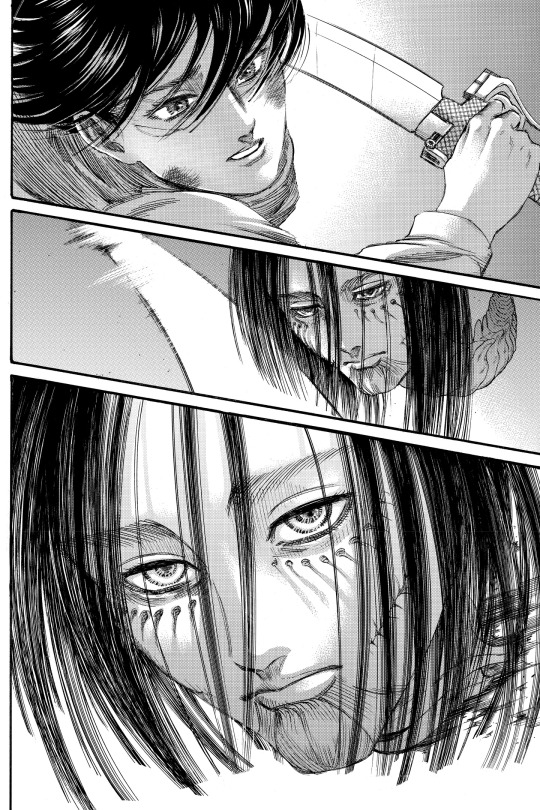
And so, the chapter that starts with Mikasa thinking that the only closure she would get with Eren was the “I’ve always hated you”, ends with the first and the last kiss between the two of them that puts all of her worries to rest.
Is Mikasa delusional?
I’ve seen this being thrown around, so i have to also tackle said point. No, Mikasa is not delusional. This wasn’t a fantasy that only she experienced. This dream of hers is the same dream that Eren had back in chapter 1. Eren experienced the exact same things she did in the dream. We even see him with his titan marks. It is clear as day that they shared these moments.
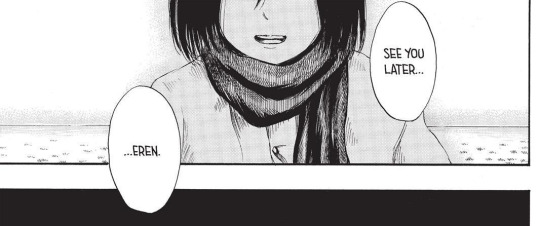
Also, i have to give credits to Isayama here for his usage of “itterasshai”. The word generally means “Go and come back safely” and is usually said to people leaving the house. For Mikasa, Eren is her home, but she is also home for him, as shown in the RtS arc:

These were the perfect parting words for the two of them. Nothing else could encapsulate their relationship better. Eren of course, won’t come back, but that’s the irony of the word here.
Moving on to the next point, Mikasa’s characterization in this final arc is about her seeing Eren for the person he truly is and stop ignoring his faults. It starts from the Marley arc and it concludes with chapter 123 where she realizes that this was simply part of Eren’s nature.
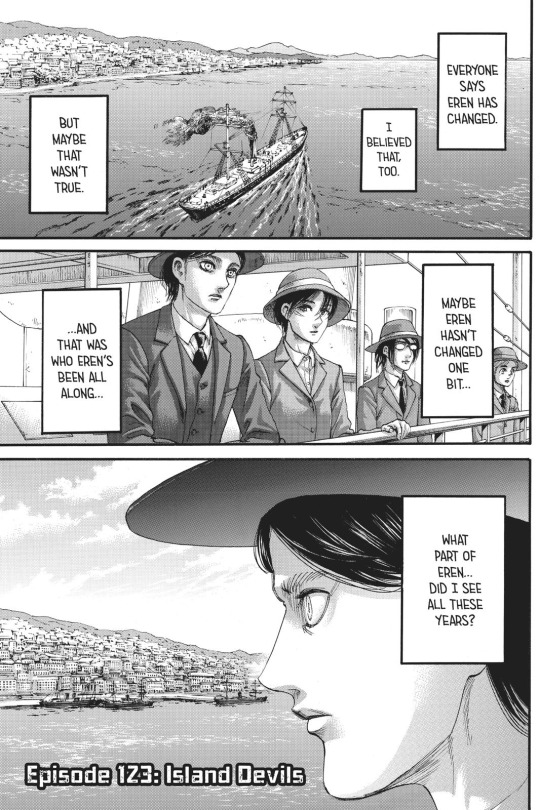
He always had it in him to become the monster that he became. However, he always had a different side to him. A side that had been shown to her a few times. At first, when he wrapped the scarf around her and later when he asked her “What am i to you”. Finally, it manifested as a desire to live quietly with her in their shared dream. It would contradict her development and characterization in the final arc, to have Mikasa start seeing an incomplete Eren again, after realizing earlier who he really was. Mikasa understood who Eren truly is and she accepted him and continued to love him anyway, even though she didn’t agree with his genocide.
It is not out of character for Eren to run away with her either. At least not in that instance. The series highlights the moment that he asked Mikasa “What am i to you” as a pivotal one. Sure, under normal circumstances, Eren would have chosen to fight, but we saw him breaking down just moments earlier. The only person that could have saved him was Mikasa. Alas, that wasn’t meant to happen.
In any instance, the biggest indicator that Mikasa is not just a delusional girl who kissed the decapitated head of the man she loved, when he never really loved her in the same way, is Ymir’s face at the end of the chapter.
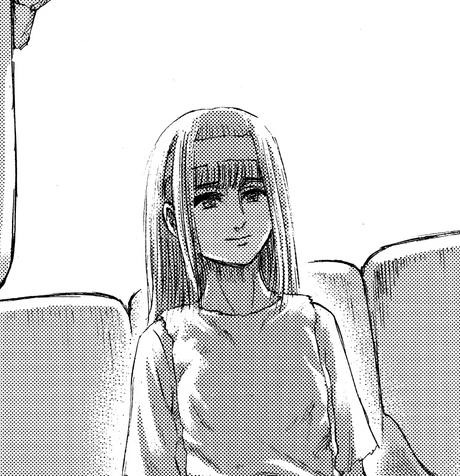
Ymir, as i have mentioned in previous posts, is a girl who never knew real love during her lifetime. She didn’t understand what she was looking at, when she first say a couple kissing with their friends cheering them on. And after that she was sentenced to a cruel life, with a man who never loved her and only viewed her as a tool. This girl, remembers longinly that scene of the couple kissing for 2000 years. She was waiting for 2000 years to see real love again.
She witnessed that through Eren and Mikasa. In a scene that would have otherwise been painted in a negative light, Ymir’s warm smile at the sight of the final act of love between two people who never got to be together the way they wanted to, clears any and all doubts regarding Eren’s feelings for Mikasa and the latter’s sanity. Eren reciprocates Mikasa’s feelings and he was alive for enough time to kiss her back, before completely fading away. Eren and Mikasa replaced the married couple and Ymir replaced the crowd that was cheering at them from 2000 years ago.
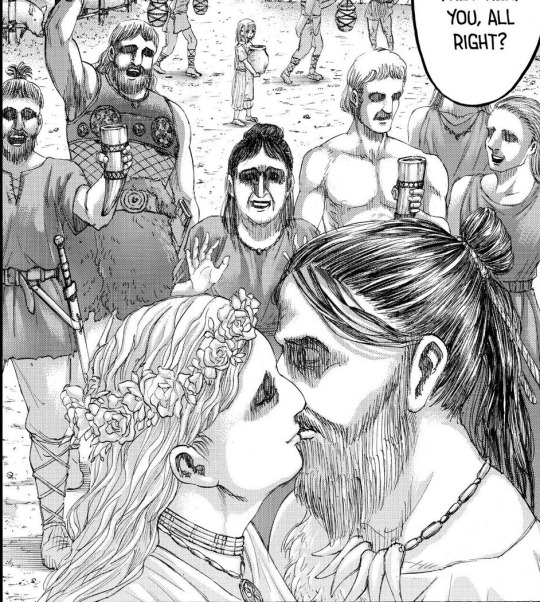
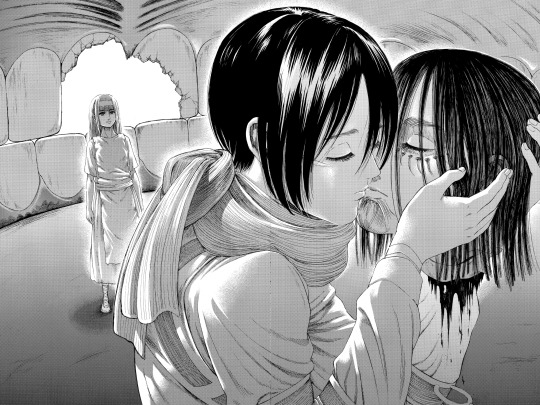
Of course, one might ask, could Eren really kiss her? Didn’t she just take advantage of him? No, he did kiss her. The way the scene was directed, it shows us that the events, which take place in their dream, mirror the events in real life. Just look at Eren’s lips one moment before Mikasa kissed him and compare them to the picture above, where they kiss. They are different.
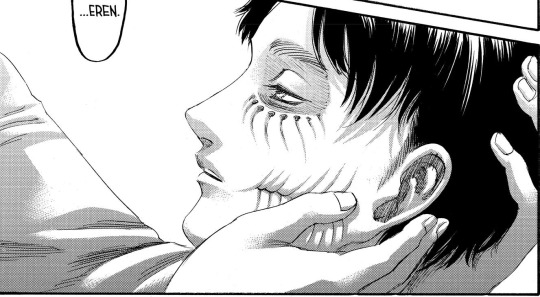
Also, you have to remeber that decapitation doesn’t kill immediately and does not immobilize facial muscles. That was the entire reason that Eren and Zeke managed to get the Coordinate. Eren survived long enough from Gabi’s shot to make contact with Zeke. Even his facial expression changes as you can see below:
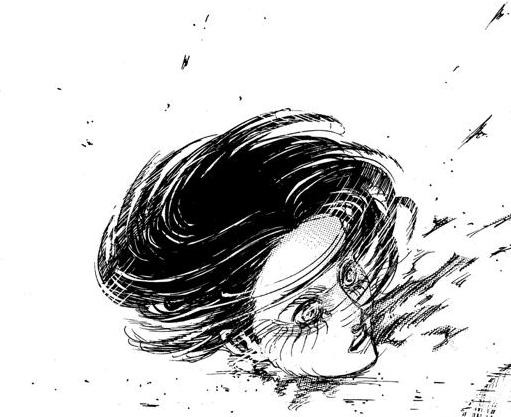
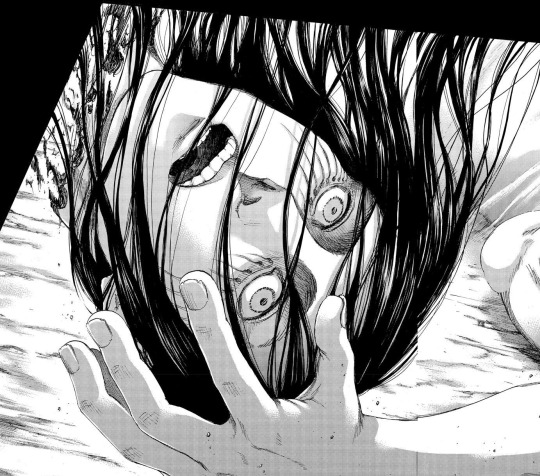
More importantly, was there really any chance that Ymir would look at Mikasa beheading and kissing Eren, while also smiling in approval, if Mikasa was a delusional girl who was unable to understand Eren’s feelings for her up to the very end? Most of all, do you think she would have allowed him to die, without experiencing real love? She died in such a way and she stayed for 2000 years in the Paths waiting for someone to show her real love. Eren was her benefactor. Would she ever allow him to die in such a way, when she was being mistreated (sexually and in many other ways) by King Fritz? I doubt it. Actually no. I don’t doubt it. I’m sure this is not the way we are meant to interprete the scene.
Eren’s relationship with Mikasa, from the very start, is an allegory for the world of AoT. The world is cruel, but is also very beautiful. Eren’s story with Mikasa starts with him murdering in cold blood her kidnappers (cruelty) and then warmly and gently welcoming her to his family by wrapping a scarf around her (beauty). Their story ends with Mikasa decapitating him (cruelty) and kissing him (beauty).
Eren’s tendency for violence has always been portrayed as going hand in hand with his better side. That side has always been represented by Mikasa. It is only fitting for them to have their most beautiful moment happening almost at the same time as their most cruel one. This is how Isayama juxtaposes this duality:
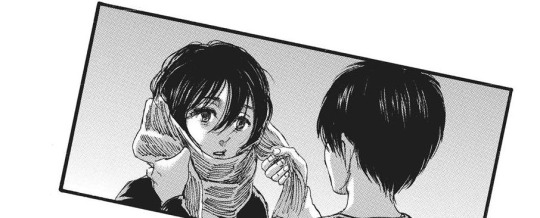
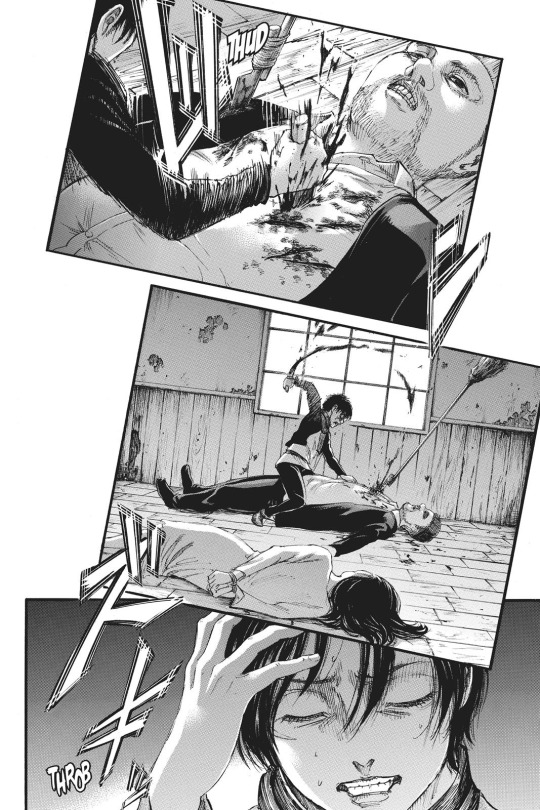
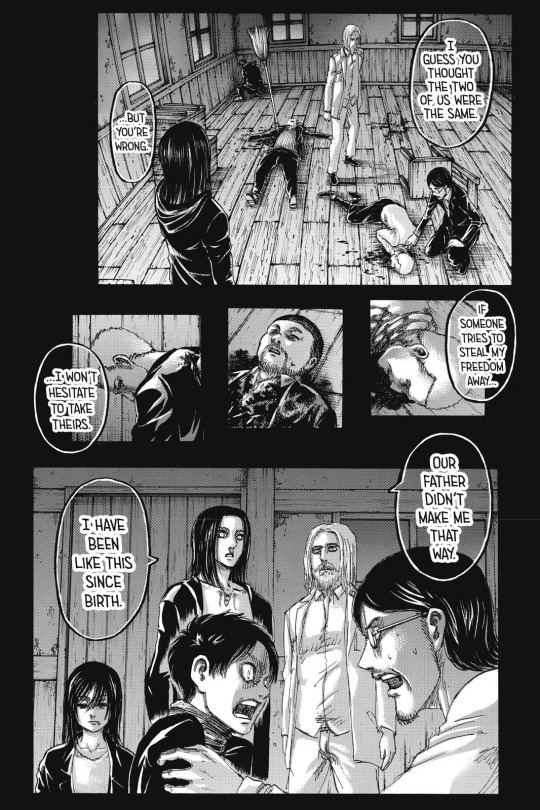
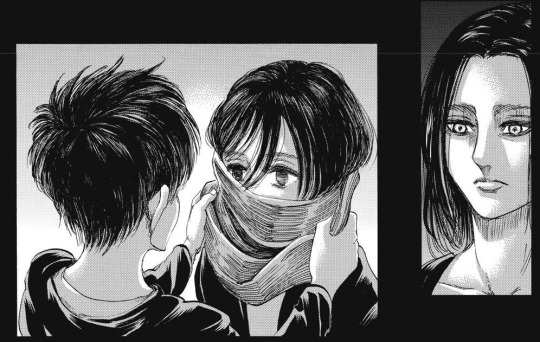
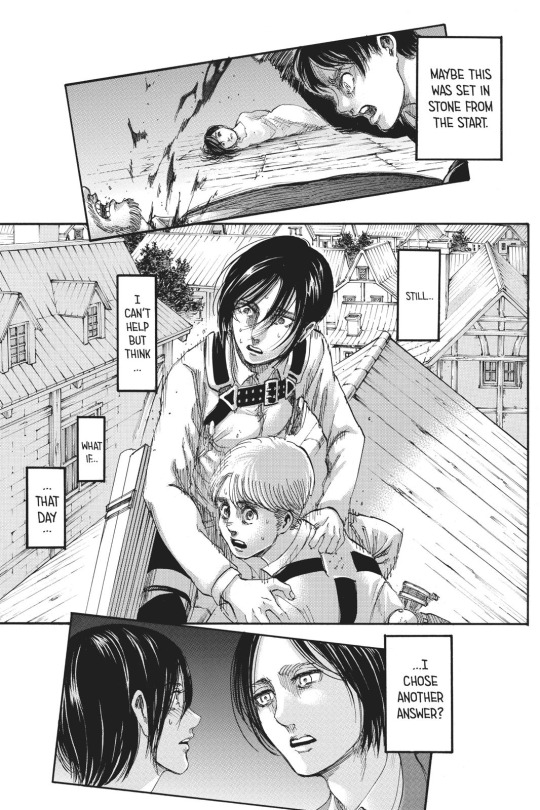
If we interprete this scene as Mikasa being delusional and Eren not being in love with her we get a very disturbing and creepy scene, between an obsessed, psychosis-suffering girl who can’t understand the feelings of Eren, a genocidal maniac who never had any chance or willingness to live a normal life, even though there are hints of that, and a 2000 year old ghost who just happily smiled at the decapitation and forceful kissing of her emancipator. I am pretty sure this is not the message Isayama wants to send. Not simply, because it is a disservice to Mikasa as a character and to her relationship with Eren, which has been one of the most prominent and consistent part of the series from the very first chapter, but because it is also a huge disrespect to Eren as a character as well. Does anyone really think that Isayama would choose to write Eren’s death like that? Not a single important person in the entire story has gotten such an exit. Not even Floch. Even Zeke, who thought that his father never loved him and only used him as a tool, got to see that his father truly did love him, before finally dying. Of course Eren and Mikasa would get the same treatment.
What i mean to say is that Eren and Mikasa’s closure won’t be recontextualized in a way that will paint their feelings for one another and their relationship in a negative light. If anyone’s expecting that, he/she will be disappointed. Eren and Mikasa were confirmed as a canonical couple in chapter 138.
On the other hand, if anyone’s expecting that this wasn’t their real closure and that they will get an even happier ending, he/she is also coping hard. Eren died here in this chapter. There won’t be a scarf rewrap (i’m here to eat my words if it happens), because Isayama gave the couple a kiss. A kiss that was in the makings ever since chapter 50 dropped. And of course, there is not going to be a baby born to Eren and Mikasa. Like, no way it’s happening. Eren is not coming back to life as that would turnish the series and it’s ending.
In conclusion, Eren’s relationship with Mikasa ended in the same way it started. Violently and Beautifully. Tragically and Happily. They acted on their romantic feelings for each other the very moment they had to part ways forever. This is how Isayama hurts us. The essence of a bittersweet conclusion.
EDIT: EATING MY WORDS AS PROMISED. EREN DID REWRAP MIKASA’S SCARF. HE KEPT HIS PROMISE.
#attack on titan#AoT#aot meta#aot 138#aot spoilers#aot theory#shingeki no kyojin#SnK Spoilers#snk theory#SNK analysis#snk meta#snk 138#ymir#shingeki no kyojin ymir#eren yeager#eren#eremika#Mikasa#Mikasa Ackerman#zeke#zeke yeager#floch#kiss#canon#eren x mikasa
2K notes
·
View notes
Text
How Bayonetta Inspires My Craft: Dancing, Fighting, and Physical Fitness.
I get writers block a lot which is why it’s taken me so long to make to this next post talking about my craft. Today I’m going to be discussing what not a lot of people may think about when it comes to witchcraft, physical fitness and exercise. When it comes to typical topics of witchcraft the focus tends to be on the metaphysical, and the spiritual. But I have always found that taken care of my physical body has always been paramount to how I conduct my craft.
There is a direct link between the health of our physical bodies and our own mental well-being. Regular exercise release endorphins which help to power our minds and can help with the negative effects of mental illnesses like depression and anxiety. And I’ve found that those effects are even more effective when I incorporate aspects of the craft into my exercise routine. And a lot of that, again, is thanks to our girl Bayonetta
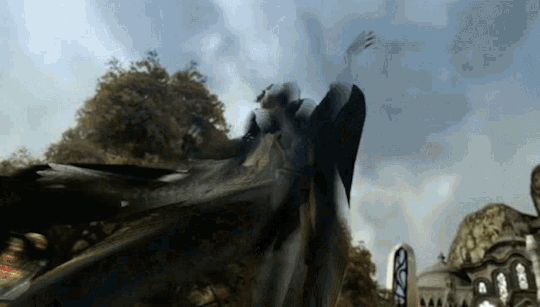
Bayonetta is pretty unique in the world of pop-culture when it comes to depictions of witches. Most witches, and magic users in general, are portrayed as scholarly types. They use their magic from a distance and focus on increasing their knowledge base of magic over prioritizing their physical bodies. But Bayonetta takes this trend and stomps it into the dirt by being a magical witch who is also a brawler. While her guns are capable of doing damage from a distance her primary form of fighting is through kicking and punching. And she does this with such style it almost appears as if she’s dancing on the battle field.
Dancing has a lot of relation to spiritual practice in many cultures. And dance movement therapy has been formally recognized as a therapeutic practice since the 1940’s. Many cultures practice spiritual dancing for prominent life events such as the mourning dances practiced by the Yolngu people of northern Australia. Dance can be an emotional release when words fail us. Allowing ourselves to be lost in movement and to embrace our bodies moving in a way that we don’t usually let them.
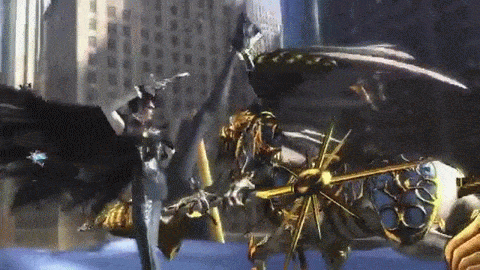
One of my favorite ways to exercise is just to blast Bayonetta’s soundtrack and just dance. And recently I’ve been wanting to sign of for a pole fitness class (unfortunately there are none even remotely in my area). Bayonetta’s pole dancing is empowering because it’s something she choices to do for herself in much the same way that many more people are picking up pole fitness as a form of healthy living and body positivity.

But Bayo isn’t just a dancer, she’s a fighter. This is actually where she inspires me in my fitness journey the most as I’m a martial artist myself. I’m currently first degree black belt in Tae Kwon Do and Bayonetta was a huge inspiration for me reaching this point. Bayo’s fighting style is a heavy mix of powerful punches and kicks much like Tae Kwon Do. And whenever I was feeling depressed or frustrated during my training, watching the beautiful way Bayo moved helped me to stay motivated. My journey to being a black belt was actually very challenging as I was moving around a lot during this time. I had to find new schools every time I moved and often had to start back from white belt under that school’s system. But Bayo kept me inspired to keep going, and Moon River, and Fly Me To the Moon are some of my favorite training tracks to this day.

Now while we never see Bayo practicing this form of exercise really per say, I would be remised if I didn’t bring up this exercise in a post talking about my craft. I’m currently in the process of getting certified as a yoga instructor. Yoga has so many ties to the metaphysical and spiritual that I could literally do a whole post talking about all it encompasses.

I’ve developed a lot of my own spiritual practices around my yoga practice. The highlights for me as far as my practice is how yoga has helped me with my flexibility training. I’m still working on my splits training and yoga with its use of stretching helps to open the body. I do a lot of yin yoga witch consists of a lot of long held deep stretches. It’s the slow and healing that balances my martial arts practice’s fast a destructive. I also love to do balance work like handstands because balancing forces you to ground yourself in the current moment. Yoga helps me find balance in my craft between the nurturing and restorative with the defensive and loud aspects of my craft.

And all of this is wrapped in how I see bayonetta as a character. She is someone who is power exceptionally powerfully, but she is not without her softer side. She can come off as imposing because of her strength and the air of confidence she carries herself with. But she has shown to be nurturing and protective of those who need it. She has shown moments of vulnerability, but remains resolute through out her trials. She encompasses all I want to have in my own self-image. That balance of the strong with the soft.

#witch#witchcraft#witches#coven#bayonetta#mystical#withcblr#yoga#martial arts#dance#taekwondo#my muse#satanic witch#male witch#gay witch#pole fitness
29 notes
·
View notes
Note
Well, *I* think that the best part of your V9E1 review is how it highlights what a fair and reasonable person you are. You're not simply ripping into the show, even though it may feel good to tear it down, you always manage to find something in it that makes you go "I liked that, a good job was done here". Your reviews might be more negative than positive, but you never take a hammer to it just because, and you always try to build it up where you can.
Thank you, anon! 🥰

To speak on that lack of balance for a moment, this is one of those instances where I can understand why the otherwise uninformed RWBY fans would take a very negative view of RWDE at face value. (Note: not that this excuses the onslaught of flaming, but rather that it explains why someone might come away with a bad taste in their mouth.) Because if there was a show I really liked, one where I was not yet able or willing to engage with criticisms of it, or if it was a case where I simply never would see eye-to-eye on those topics, then yeah, seeing a 9k review that was primarily negative would not leave a favorable impression on me. I'd question what this poster's "real" goals were and might come to the conclusion - one that many RWBY fans have - that it's stemming from some deeper bias ("You just hate women! Queer people! Shows that are successful when you're obviously not!"), or a desire to stir up drama for internet engagement. Of course, I'd like to hope that in this hypothetical my critical thinking would kick in and I'd realize that disliking aspects of a show doesn't automatically equal such insulting accusations and that making "clickbait" posts on tumblr of all places is ridiculous when this website offers few monetary opportunities... but I can see how the general pipeline of "They're crazy critical of something I love, so clearly something must be going on because obviously the thing I love is not flawed" is going on.
At this point, you'd have to go back 4 - 6 years to see the development from "I love this show!" to "I still really like this, but RWBY's long term flaws are starting to cause bigger problems" to the current "Wow, I feel like there really is more to criticize than praise. That sucks." I don't know a single RWDE poster who came into the fandom hating the show because... who does that? Sure, there are some Nearly Universally Hated shows that people want to talk about (like the new Scooby Doo, for example), but generally speaking you don't engage in a fandom unless you have some investment in the original product. We are fans: those who fell in love with RWBY, write fics for the show, attend cons, create fanart, etc. But I think it can be hard for a lot of other fans to realize that when, yeah, reviews have become so critical, leaving only those "Well, they tried to build it up!" moments to balance things out. Newcomers to my blog aren't going to read a heavily negative recap and then look at the RWBY fic I've written, the holiday exchange I host, the three year old recaps that had a lot more to praise. They see the current state of things and let that and that alone inform how I feel about RWBY. There's little incentive or ability to think about why there's so much to criticize now, beyond those easy accusations. So every Volume now we have this continual resurgence of, "They just hate RWBY! Send them death threats until they leave😡"
31 notes
·
View notes
Text
Analysis of the Family Agreste Portrait
Quarantine strikes again and since the Agreste family portrait has fascinated me for a loooong while now I decided to put my thoughts into words and write another essay x3
The amount of informations we get out if it is amazing and its not only highlighting the absolute TRAGEDY it is that this family is about to face such a horrible fall out, it also hints at the former family dynamic before everything went to hell.
So make yourself comfortable and get something to drink, because we will be here for a while.
Here we go: My analysis of this beauty of a fictional portrait
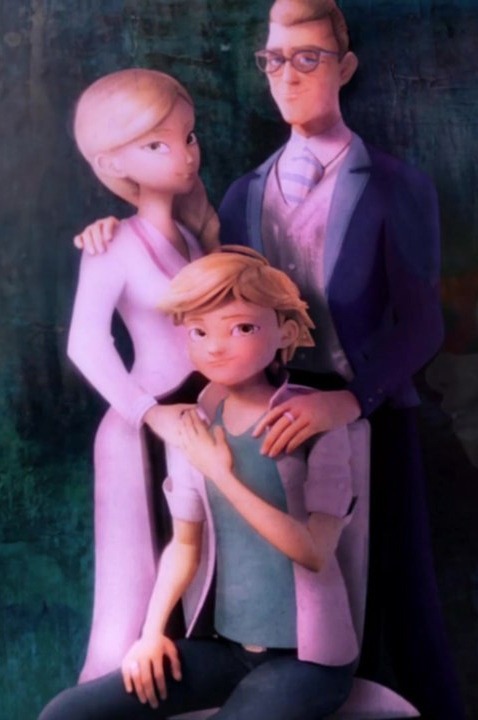
Let's start with the most obvious one: Hawkmoth.

Its commen knowledge by now that the background makes it seem like Hawkmoth is standing behind the Agreste family like a bad omen waiting for fate to take its course and cause their doom. The portrait is brilliantly designed so the illusion is created that Gabriels body (here in a blue suit closer to Hawkmoths normals dark purple one) overlaps with Hawkmoths and a darker line is connecting the two faces as well, which rest on the same height right beside each other. The very same line grows bigger as it goes further behind Emilie - coloring her entire background - showing us that EMILIE is all Gabriel sees when he becomes Hawkmoth. But notice that Adrien on the other hand can hardly be concidered part of Gabriels “sight” at all.
Its forshadowing 101 and damn beautiful if I may say so. But this isnt what I want to focus on in this post.
I want to elaborate on two other key factors that tell us about the former dynamic of the Agrestes instead and what they tell us about the present and future.
The heart:
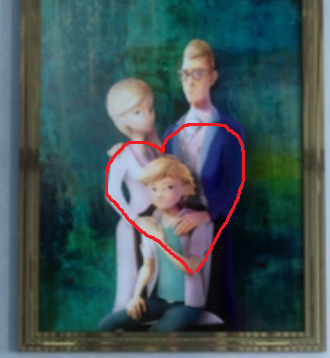
This is hitting me on another level because look at the heart these three form with Adrien right in the middle! He was so LOVED. This family may have never been anywhere close to ideal but still, there was LOVE and now he's gonna loose it all.
Adrien already lost his mother which led to his father getting even more distant and cold and now his father is becoming increasingly more abusive as he falls deeper and deeper into villainy. Gabriel was never a good father, the show has already made this clear with episodes like "the bubbler", “the collector” or "Gigantitan" for example but gosh there was hope for their little family! The end scene in "Jackady" portrayed it perfectly and I wrote a whole other post just covering the sigificants of Adriens and Gabriels hug in that episode. Check it out here if you want, it goes hand in hand with this one.
Miraculous is all about love and the completely different ways it can affect us, our behavior and actions. Because love isnt just wonderful, pure and empowering, it also can be twisted, destructive and cause the darkst nightmares. And with this family the writers know how to portray the complex love in an abusive houshold thats destined to go up in flames and they also know how to hint at their troubled past with the family portrait.
But this heart visual tells us even more in connection with the positions of their hands. And with these two key factors, lets start with Gabriel:
His hands convey it so strongly. He loves/d Emilie and Adrien so much and no doubt this love for them was certainly the reason why he started his quest as Hawkmoth. But he is now losing himself more and more in the pleasure of his villainy to the point where he forgets why he's doing it in the first place and becomes a complete monster (of a father). But this turn and spiraling into villainy didn't came out of nowhere - this root already had to be in him to grow like that. And this is also something the portrait indeed hints at as well.
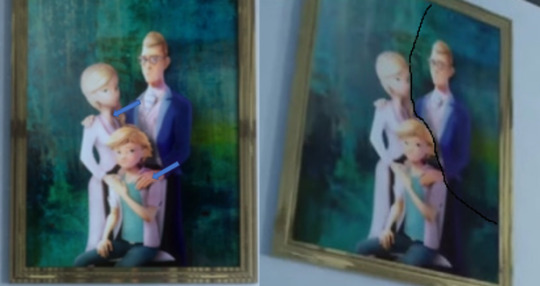
Because Gabriel is the only one of the three who:
1. We see so completely open and without hesitation reach out and hold BOTH his family members.
2. Is visually “cut off” from them as well.
But this doesn't mean he was excluded and the only one who truly cared and loved, it just shows that things were more... complicated...as usual.
This is best explained with Adriens hand placements:
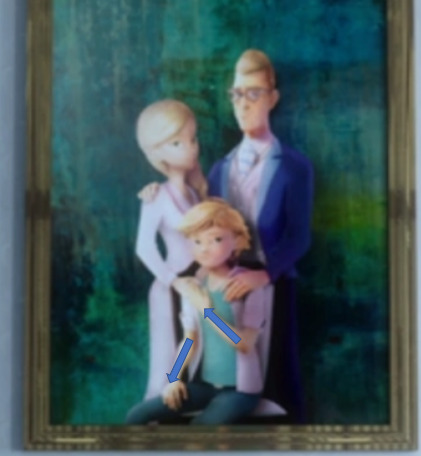
One hand is holding his mothers but the other one is visibly not reaching out for his father. But as we all know, that's not because Adrien doesn't love him. In season 1-3 it is made more than clear that Adrien does not hate his father - he loves him alot and tries to be there for him and be patient because he knows that the loss of his mother brought his father terribly down.
Sure, Adrien gets frustrated and angry with him, literally how could he not?? But Adrien tries his best to reach out to Gabriel so they can bond and come out of this tragedy stronger.
But this loving willingness to forgive his father for the chance of growing a father-son bond with him doesn't change the fact that these two didn't had a bond prior to this. And let's be honest here, does anybody actually think this distance between them was caused by Adrien? I don't think so.

So notice how Adriens hand - not reaching out for his fathers - is the only one in the portrait NOT inside or forming the heart.
When the connection of the hands between the family members symbolise their connection to another, then Adrien keeping the hand for his father away from the display of love is VERY telling. It tells us very directly what this distance did to Adriens side of the relationship. Despite Gabriels hand being right there, Adrien does not meet the gesture. And I cannot believe that he did it out of resentment, nothing in the show indicated such strong negative emotions from past Adrien.
It's much more likely that Adrien not reaching for his fathers hand is meant to show us that Adrien felt that he either CAN'T return the gesture because he fears that it'll end in an unpleasant reaction from Gabriel - that it isn't Adriens "place" to reach out to his busy and distant father like that, like it's demanding something - or Adrien simply didn't took Gabriel laying his hand on his shoulder, in the context of posing for a portrait, as a gesture of love and affection.
The way I interpret the portrait is that prior to Emilies dissappearence Adrien did not exactly try to reach out to his father the same way he did from s1-s3, which, I mean, of course wasn't the case. Not only is it NOT the 13 years olds (or younger) job to form an emotional connection to their absent parent - when that’s the PARENTS job - it also wouldn't be necessarily "needed" for Adrien to do so.

Because Emilie at this point was still in the picture so and she was the complete opposite. She was a (or maybe the ONLY) safe, reliable and loving constant of parental attention, affection and care in his life and because of these two HARSH contrasts Adrien learned from very early on to focus mostly completely on her in that regard while kinda blocking his father out.
That most likely wasn't even an active choice whatsoever - Gabriel proofed to be an unreliable resource so Adrien learned to subconciously treat him that way out of self protection. That doesn't mean he had any kind of dislike or malice against his father it just means that he wasn't able or allowed to connect with Gabriel the way he needed. Several episodes show that Gabriel deadass only parented like 15 minutes tops in his life with one of the worst offenders kinda being “Gigantitan” ngl.
So yeah, when I see that the portrait wants to tell me that prior to Emilies loss, Adrien - a 12-13 year old at most - is THIS used to rely solely on the strong bond he has with his mother and not even really reaching out for his fathers love, then I can't help but interpret it in the way that... Well... Gabriel was so distant and emotionally unreliable to Adrien for all his life, that Gabriel simply... wasn't needed by his son. Not at that point of time at least.
And while this may seem weird, because obviously Adrien only now starts to stop craving for his fathers affection and approval (which is btw a horrible, HORRIBLE thing and not something good. A half orphan losing the last remaining hope he had left of having the chance to finally get to form a bond with the only other parent he has left, just to be crushed by disappointment and abandonment all over again until he let's go, is REALLY NOT as much of a good thing people will make it out to be. This is... plain awful) it's actually quite logical.
Adriens hand outside the heart doesn't mean that his father meant nothing to him and therefore refuses to meet and accept his affection (that's literally the complete opposite of what the show shows us), it means that Adriens and Gabriels father-son relationship suffers from a fatal emotional disconnection caused by miscommunication/ a lack of communication.
And this was caused by Gabriel. How? Let me elaborate on that by going a bit far afield (cuz lbh we all have time for this. I’m writing this in quarantine and youre reading this is quarantine, so lets gooooooooooooo).

In "The bubbler" Adrien says that his father "always forgot his birthday", but I cannot agree with this in true honesty. Gabriel is controlling his sons entire life, calls him "the epitome of perfection" and temporarily truly gave up being Hawkmoth for him, he definitely never forgot Adriens birthday.
"The bubbler" even SHOWS us that Adriens perspective of the situation is actually not the truth:

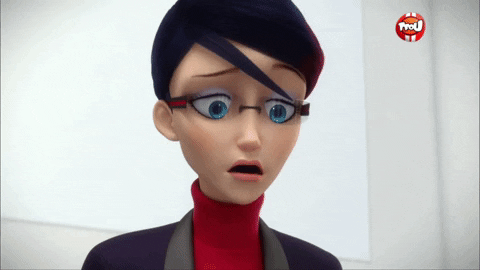
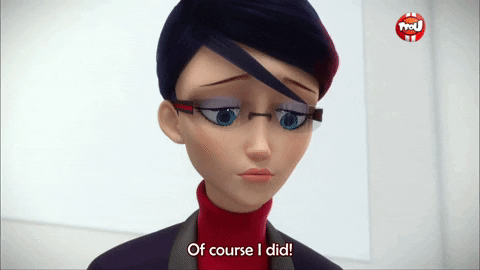
This is Adriens first birthday after Emilies dissappearence and it's incredibly telling how Gabriel handles the planning.
What this entire little sequence tells me is that Gabriel is completely and UTTERLY used to NOT be the one to take care of anything related to Adriens birthday. So Emilie was always the one who did it but somehow - now without her - Gabriel apparently still hasn't even considered changing anything about that nasty non-involvement and just expected Natalie to pick everything up where Emilie left it.
Because let's be real here, knowing Natalie she would NOT have forgotten to get a present if Gabriel truly had told her to. Natalie is never presented to do mistakes like that but Gabriel on the other hand IS definitely presented to us claiming things about himself as ultimate, blameless and true when they simply do not reflect reality. A great example: Gorizilla
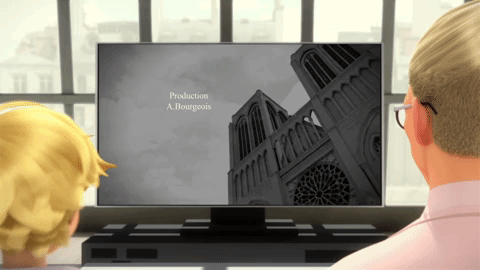
You didn’t even speared a minutes of your time for Adrien and he DID try to! Asshat… It's a problem guys. The lack of self awareness Gabriel displays in moments like this is legitimately concerning when you think about how deeply this man is falling right now.
But back to the topic:
Because even if Gabriel didn't even consider doing anything himself for Adriens birthday - not even taking the time to SEE his son (who just recently lost his mother, come on Gabe, really?) - one thing one cannot hold against him: he sure as hell remembered Adriens birthday like any decent parent would and it wasnt portrayed as a this-year-for-the-first-time thing.
And yet Adriens statement still makes complete sense. Because a big, BIG problem with Gabriel is just how much he takes things for granted. He EXPECTS things to be universally known and to never be doubted, just because that's how HE sees them. I will write 10 essays if it's needed to make people understand that Gabriel DOES truly love Adrien, it's just that Gabriel HIMSELF is such a rotten, twisted and toxic person that he cannot see how much his (oppressing) behavior and the way he (doesn't) express his love hurts Adrien and that HE is the one at fault. (for more, once again, read this)
Gabriel LOVES Adrien but he takes the love he feels as such a matter-of-fact that he just completely... forgets to show it.
And when we take Adriens words and look at the Family portrait it unfortunately seems that...

…. Gabriel ALWAYS forgot to show it.
Adriens hand - that should at least be reaching out to his father - is outside of the heart in accepting certainty. Because that's what Gabriels non-presence was for Adrien while growing up: an unreliable and unreachable certainty he had to accept early on as safer to not try to emotionally depend on too much or else he will get hurt.
So yeah, Adrien is the one in the portrait who is very openly not reaching out but only because Gabriel never gave him the needed affection and stability to be able to create that bond.
But let me correct what I said a little earlier: Adrien ALWAYS needed his father. Every kid, especially one in a bad situation like Adrien, does need their parents/friends etc as support system to become independent and confident in a healthy way. And if they don’t have that they WILL crave and look for it!
What Adrien has been doing up to now IS normal for a teenager - humans NEED affection, belonging and safety. What ISNT/SHOULDN’T be normal is Adriens disconnection towards his father in the portrait and just how much Gabriel fails to take care and BE THERE for his son in BOTH TIMES!
Collector:
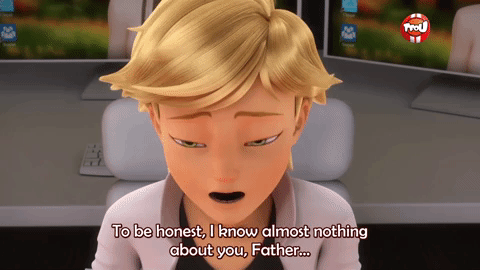
Bother Christmas:
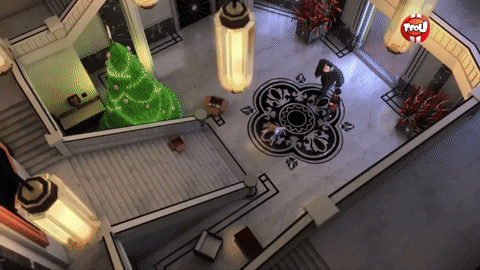
One thing I like about the show is that it portrays their young main cast with one very important truth: The psyche of a child/teenager of their age will react and adapt so it SURVIVES, even if it results in unfortunate consequences in other relationships and places. Thats the psyches main concern and it'll try to cope with the limited experience and development it has in whatever way necessary to get itself to the next day. A coping mechanism is not there to make you a better person, it ensures your SURVIVAL, everything else is a secondary concern.
So seeing pre-show Adrien not react to Gabriels touch and even feel completely unloved and disconnected from him is no surprise to me. Kids are incredibly observant. They may lack the needed experience and knowledge to truly understand that they deserve better and to stand up for themselves but they are masters in picking up red flags in people and can put this danger into perspective while comparing the different danger levels of their options of people and places to adjust their behavior.
Feast:
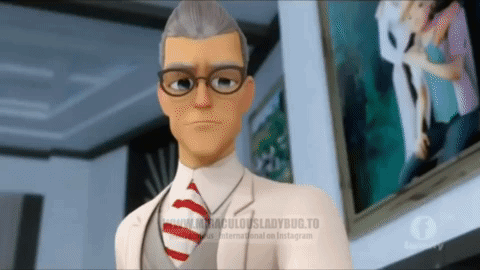
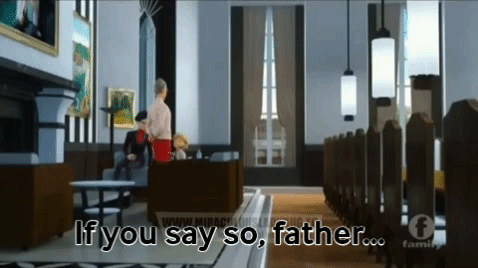
Stormy Weather 2:



So the broken connection between father and son we see in the portrait (that Gabriel doesn't even notice but Adrien fully internalized) isn’t there because Adrien “didnt needed” or wanted his father, its because Adrien NEEDED Gabriel so much in his isolated upbringing but Gabriel didn’t LET him need him - so Adrien had to adjust to that accordingly. Big, huge, ENORMOUS difference.
Honestly the most miraculous thing about Miraculous is that Adrien was able to bring up the strength to stay positive and friendly and to forgive Gabriel in hope for a better future. That boys situation is 7 kinds of depressing and traumatizing...
It's just flabbergasting to me how well this portrait shows how basically non-existent their relationship was at that point. And it's horrible to know that this estranged and unformed bond is all Adrien had left after Emilie dissappeared, just alot worse because after Emilie incident Adrien states that his father changed alot for the worse as well.
So to think that all Adrien had left wasn't even this former basically non-existent relationship with his aloof father - who would only barely show his true affection for his son because he's either not around enough to do so or he thinks it "unnecessary to proof his affection" for/to Adrien because he already thinks it so obvious and undoubtable.
Well he thought wrong. And GOSH, it breaks my heart!
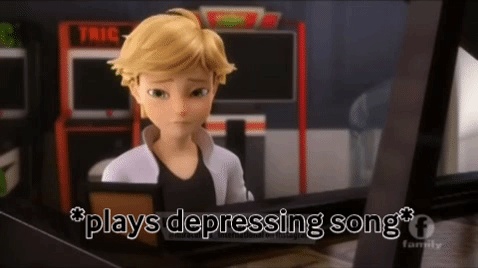
So now comparing the "Gabriel" hand from Adrien with the one representing his connections with his mother conveys a pretty harsh contrast.
Because last but not least, let's take a look at Emilies hand placements:
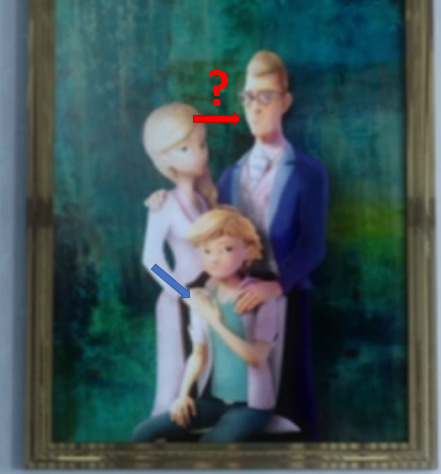
But here is now an interesting difference to Adrien. Whereas we openly see that Adriens side of the Adrien-Gabriel relationship is completely disconnected from the heart/love - showcasing just how badly Adrien has always been neglected by his father - we don't see Emilies hand in her Emilie-Gabriel relationship AT ALL.
Once again just like with Adrien, this doesn't mean she didn't love her husband and that Gabriel was used and fooled by the woman he so utterly adored. It just means that from Emilies point of view things were a bit more complicated. What exactly this is, the portrait is keeping secret from us. We have no way of knowing if and how Emilie is returning her husbands gesture. All we can say is that if she does she is definitely not doing it in such an open and unconflicted way as she does with Adrien.
But since when has anything with this family been this easy?
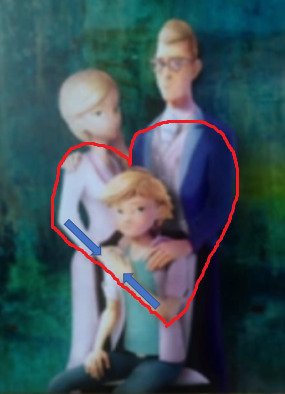
One thing the portrait makes very clear, Adrien and Emilie had a strong and good bond. Definitely the healthiest because the Adrien-Emilie connection is the only one depicted without any kind of disruption from both sides. Both mother and son are reaching out for the other ones hand creating a whole half of the heart, showcasing their affection for another openly and without any of the implied doubts the other connections display. And honestly? Comparing all the hand placements, the one connecting Adrien and Emilie just comes across as strikingly pure and true (which makes it even worse that it was HER Adrien lost…)
As I said it's a HARSH contrast to the one Adrien shears with Gabriel. This contrast is highlighted even further by the way these three face on another.
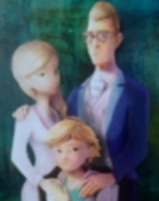
Emilie and Adrien are positioned facing another and so are Emilie and Gabriel. Telling us that Emilie was "face-to-face" aka involved with both her husband and son. It is Adrien and Gabriel were this looks wildly different. These two have no way of seeing each other in the eyes the way they stand now/then, further displaying their deeply rooted disconnection. It's portrays perfectly how important Emilie was in this family dynamic, because even though Adrien and Gabriel bearly had a connection at all they at least had Emilie as a link between them, keeping the family together. But then they lost her and where this left both father and son off we know oh too well...

So to collect all the informations we get out if this portrait:
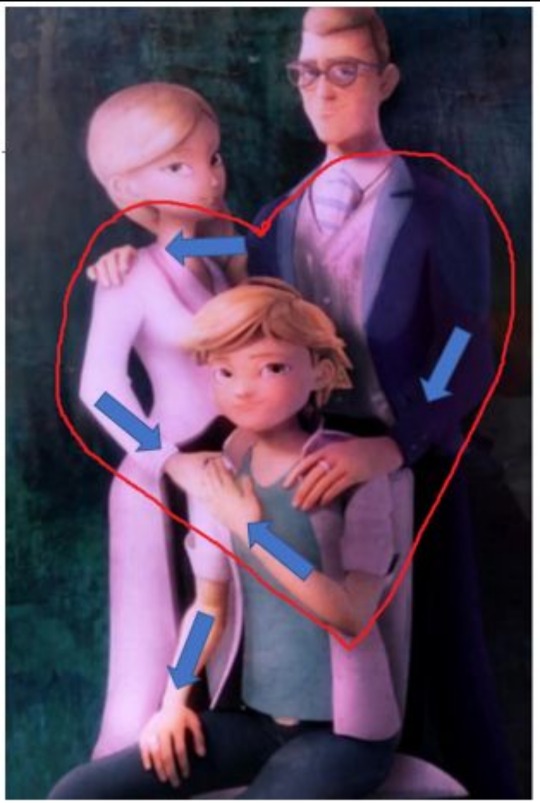
-Adriens and Emilies relationship was the strongest and purest. Both of their hands connect and reach out for another in the heart, showcasing that they had a loving and positive bond.
-Adriens and Gabriels relationship is heavily scarred by a deeply rooted disconnection leaving Adrien feeling unloved and unwanted by his father to the point where Adriens side of their dynamic is outside the heart altogether. Gabriel may love and adore his son just like he loves his wife and never thought he displayed his love for him in a lacking way, but fact is: this love never reached Adrien the way it should have and Adrien is the one in their dynamic who got severely hurt and damaged by it.
-Gabriel was the only one completely unconflicted and happily at peace with the former Family situation. He's reaching out to both his family members with open love and affection in blissful oblivion that neither his wife nor son could return them the same way (to different degrees for different reasons). Gabriel was the ONLY ONE in the Agreste family who didn't saw problems in their lives and thought them all happy, hence why he's so obsessed with changing the past and bringing THIS state of their family back. He was happy and he had everything he needed and loved right with him, of course he wants THIS back. He's not aware that Emilie and ESPECIALLY Adrien did not feel the same about their former situation and that bringing all of them back to this is not the perfect happy ending for their entire family as he thinks.
-Emilie may not have been as unconflicted with Gabriel as he was with her but she is NOT feeling the same disconnection her son feels and isn't depicted with negative feelings towards Gabriel. Her side in the Emilie-Gabriel relationship is neither shown outright positive as with her son or outright bad as Adrien with Gabriel. Her side of their bond is depicted through her unseen hand placement in the unknown area in between.
-Despite their not so unconflicted feelings towards Gabriel - and Gabriel himself being aloof - neither Emilie nor Adrien are actively trying to cut Gabriel out. They aren't flinching away from his touch or exclude him from the heart whatsoever. He's happily included, obviously feeling loved. They may not be 100% happy and Gabriel doesn't notice it, but they aren't denying him his happiness and make him unhappy. Again, he's the only one truly happy here. Something neither Emilie nor Adrien tried to take away from him.
-Emilie and Adrien are facing each other as do Emilie and Gabriel, implying the presence of communication and a bond. Adrien and Gabriel do not face each other, showing their disconnected bond. If they could see each others face Adrien would have been able to see that Gabriels hand is a gesture of genuine affection and Gabriel could see that Adriens expression does not exactly display pure happiness the way he thinks. This also goes for Emilie. Emilie just like her husband is placed BEHIND her son, so even if she is facing him she would not be able to really see just how much Adrien is not satisfied and truly happy with his life at that point (meaning how unhappy being looked up, friendless and at distance with his father actually makes him).
- This fascinating family makes me sad and I like it lol
#Miraculous#Miraculous Ladybug#adrien agreste#Gabriel Agreste#Emilie Agreste#family agreste#Agreste tragedy#natalie sancoeur#Agreste family portrait#Chat Noir#Cat Noir#hawkmoth#le papillon#ml analysis#this family is fascinatingly depressing to think about#I love them#I want Adrien safe and sound and loved with the Dupain-Changs#because everything Agreste is doomed and I want my son to be happy#Gabriel Agreste needs priorities#and Emilie needs to tell me what the fuck she did to set all of this off
735 notes
·
View notes